Refresh
New contenders for the best gaming laptop
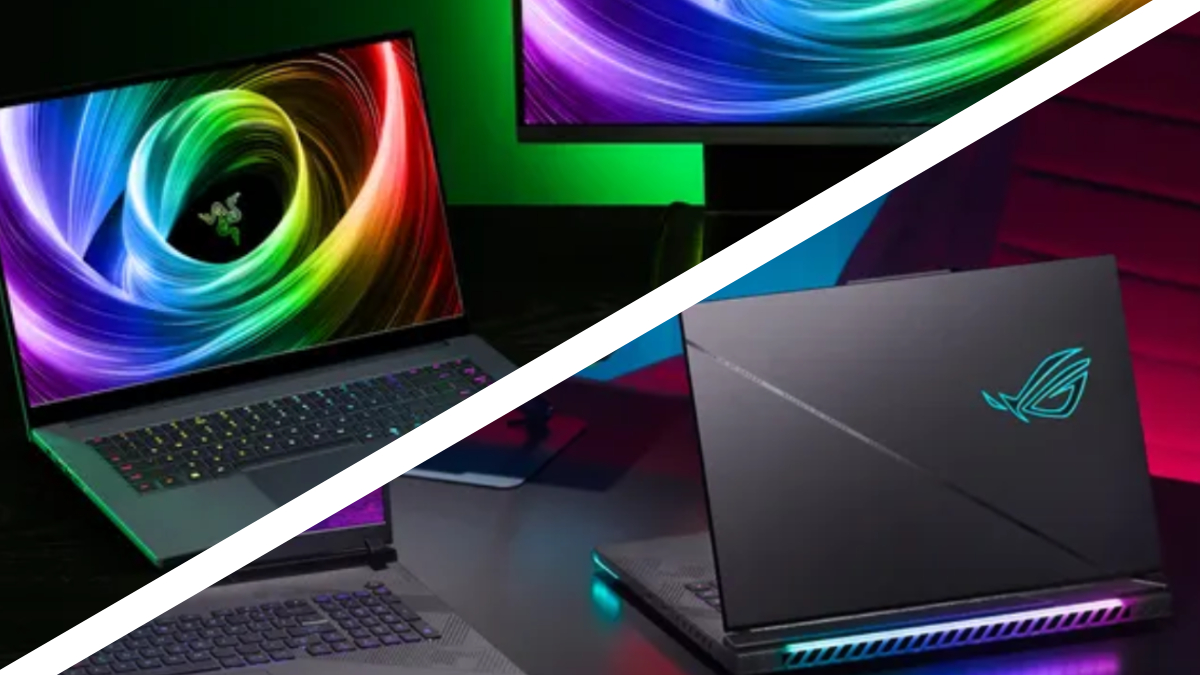
With the announcement of Nvidia’s 50 series graphics cards comes a wave of new gaming laptops kitted with the latest Team Green has to offer. We got to see some of these at CES, and based on our first looks, there may well be some contenders for the next best gaming laptop on the market.
Razer announced the thinnest laptop the company has ever made, the Razer Blade 16, which is still jam-packed with Nvidia and Intel- err, actually, AMD power.
This is the first Razer Blade laptop to feature an AMD processor (the Ryzen AI 9 HX 370) over Intel’s CPUs, and we think it may be because AMD chips tend run cooler during intense graphical situations, allowing the Blade to stay thin without deep frying your lap while you try to game.
There were also a host of new Asus laptops revealed at CES 2025, with the Strix G16 and G18 drawing eyes to their flashy RGB underbellies. The Rog Strix lineup is also equipped with Nvidia’s new 50 series GPUs, particularly the 5080; if you want to get your hands on a 5090, the Asus Rog Zephyrus G16 is the one you want.
The Zephyrus G16 has a gorgeous 2.5K OLED ROG nebula display and a max refresh rate of 250Hz, which is a fantastic sweet spot for both story-based single player titles and fast-paced competitive games.
We were hoping to see new handheld gaming PC announcements from both of these companies, but curiously enough, neither Razer nor Asus has any immediate plans to share in that regard. These terrific gaming laptops will just have to tide us over until we do hear something.
HDMI 2.2 revealed after 8 years
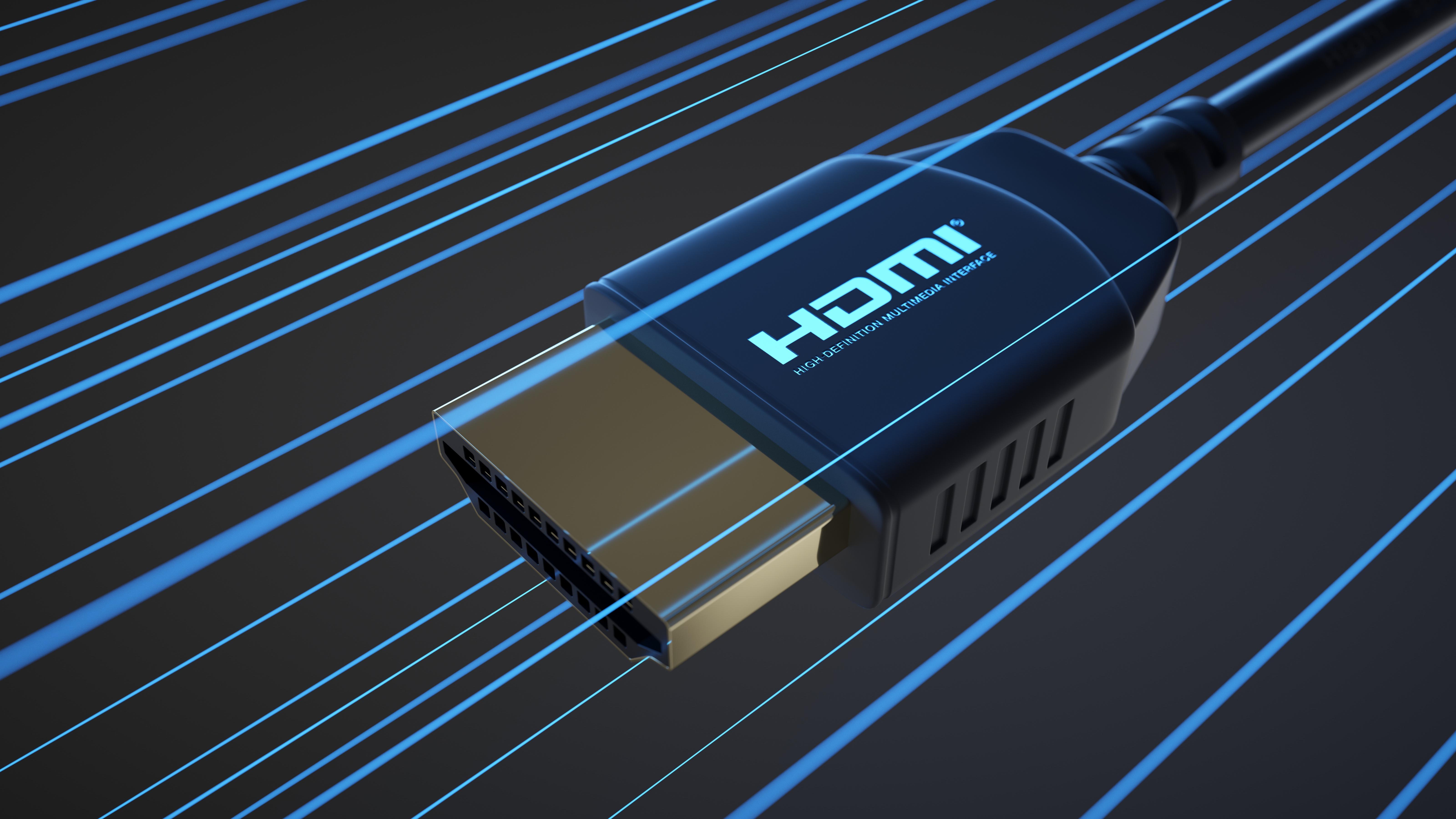
Chances are, you’ve used an HDMI cord in the past year for your PC monitor, TV, VR headset, or console. It’s one of the most widely used connections for quickly transmitting data, and thanks to the engineers at HDMI Forum Inc, it just got even faster.
HDMI 2.1 was first announced back in 2017, and now, a full eight years later at CES 2025, versions 2.2 was announced.
HDMI 2.2 supports a wide range of resolutions, including 4K, 8K, 10K, 12K and even 16K – the latter two of which are new for HDMI 2.2. It will also offer better bandwidth over the previous gen, reaching 96gbps compared with HDMI 2.1’s 48gbps and DisplayPort’s 80gbps. What’s more, HDMI 2.2 will also support a 4K resolution at a blazing-fast 480Hz.
HDMI 2.2 will be available to supporting manufacturers in the first half of 2025, meaning while this new standard is exciting for performance-minded tech enthusiasts, we won’t be seeing it added to flagship devices and powering 16K monitors just yet.
Need more screen?
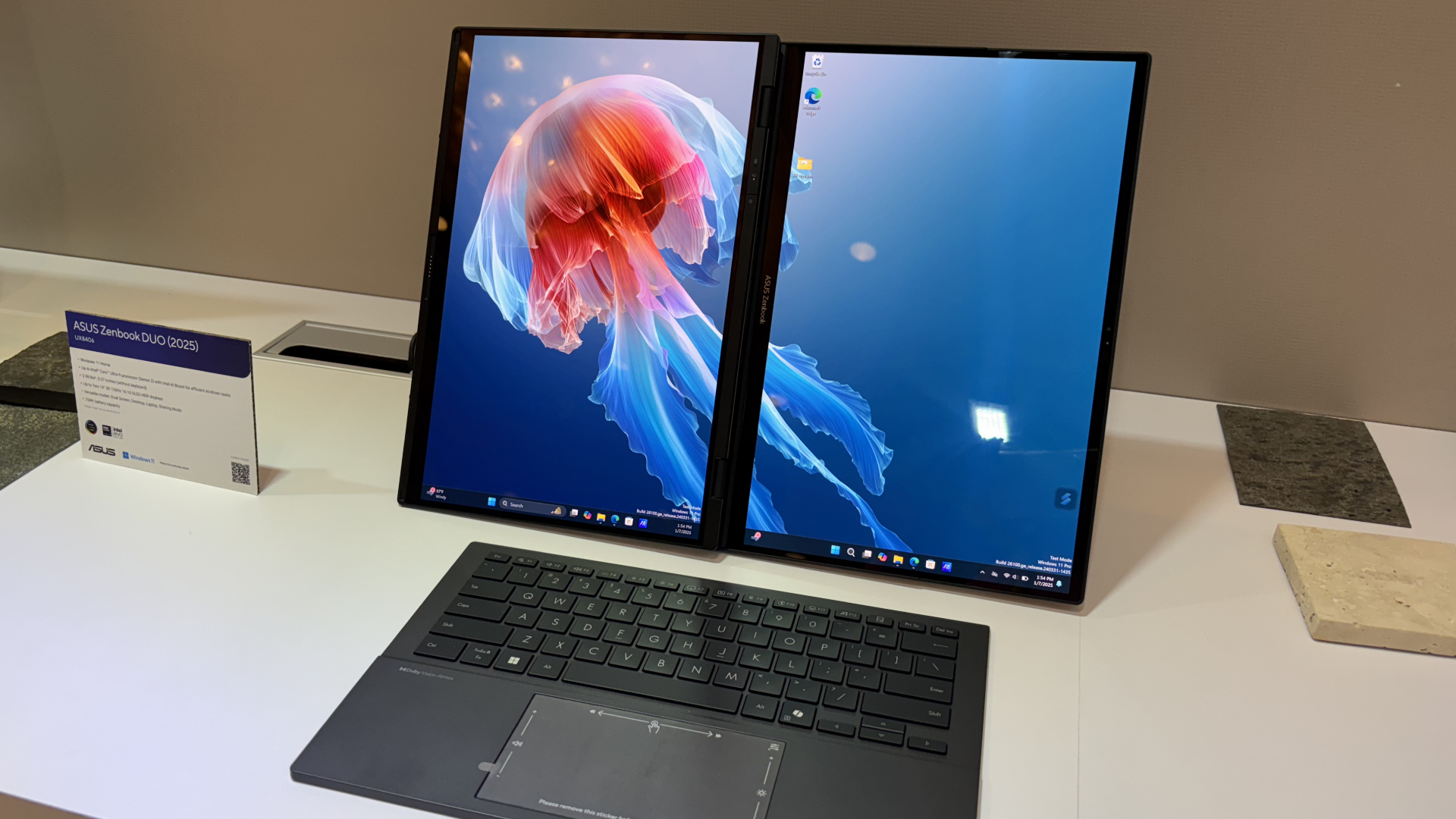
There are pros and cons to working from a laptop. On one hand, you get that effortless portability, but on the other, you’re typically limited to a single, small screen.
The Asus Zenbook Duo (2025), first shown at CES 2025, throws that idea to the wayside and gives you the productivity possibilities you deserve with a dual-screen setup that you can use in either an over-under (portrait) or side-by-side (landscape) layout.
This year’s model features Intel’s Core Ultra series processors (up to Intel Core Ultra 9 285h), Intel Arc graphics, and 32GB of DDR5 RAM at just 2.98 lbs (1.35kg). For a laptop with two displays and a detachable keyboard, that’s pretty lightweight. Both displays are also touchscreen-enabled, and the Asus Pen 2.0 is included for digital art or graphic design.
The flexibility you get with the screens paired with the performance on offer here is well worth the $1,699 asking price in our opinion – but only if you’re someone who needs that extra screen real estate.
Koorui unleashes the world’s fastest monitor
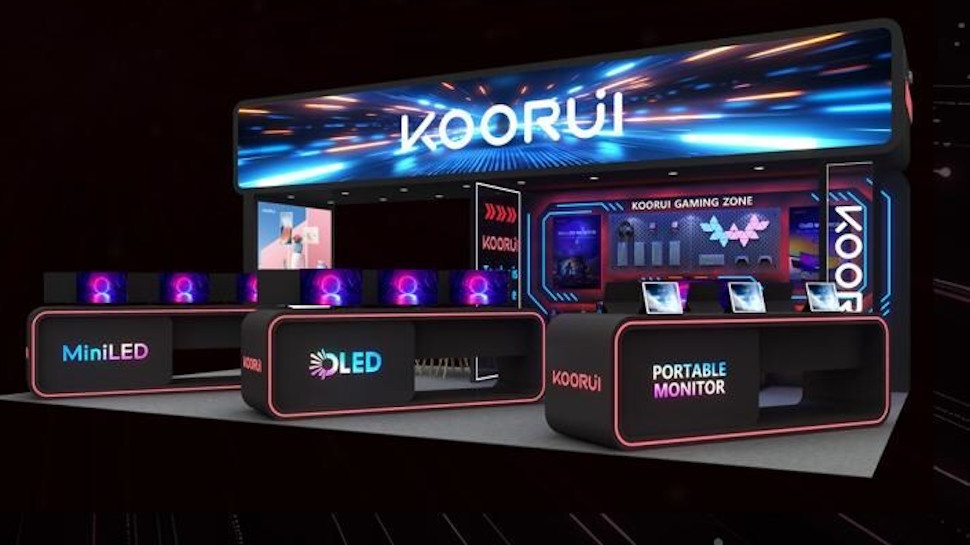
Marcus Mears III, TechRadar’s Computing Reviews and Buying Guides Editor here. PC gamers love to push the boundaries of their hardware’s performance, eking out that extra bit of FPS wherever possible. But Koorui’s new 750Hz monitor, unveiled at CES 2025, takes pushing performance boundaries to a new extreme.
At its 750Hz refresh rate and 0.5ms response time, the G7 is now hands-down the fastest gaming monitor on the market. Almost no hobbyist PC builder will be able to achieve anywhere near the performance needed to make use of a spec like that – so who is this monitor for?
There’s an argument to be made for esports professionals and content creators. If you’re trying to hang with the best of the best, your hardware needs to keep up, and trust me, the G7 is up to the task. With Nvidia boasting the RTX 5090’s 800 fps in Valorant, an ultra high refresh rate monitor that can match that energy may actually have a place in top-tier setups.
But part of me can’t help but wonder whether the 750Hz refresh rate truly is created for hardcore enthusiasts, or if it’s just another stepping stone in the arms race of “who can put the highest number in the headline?”
Denon’s 22-speaker in-EV audio system will have us all living in our cars
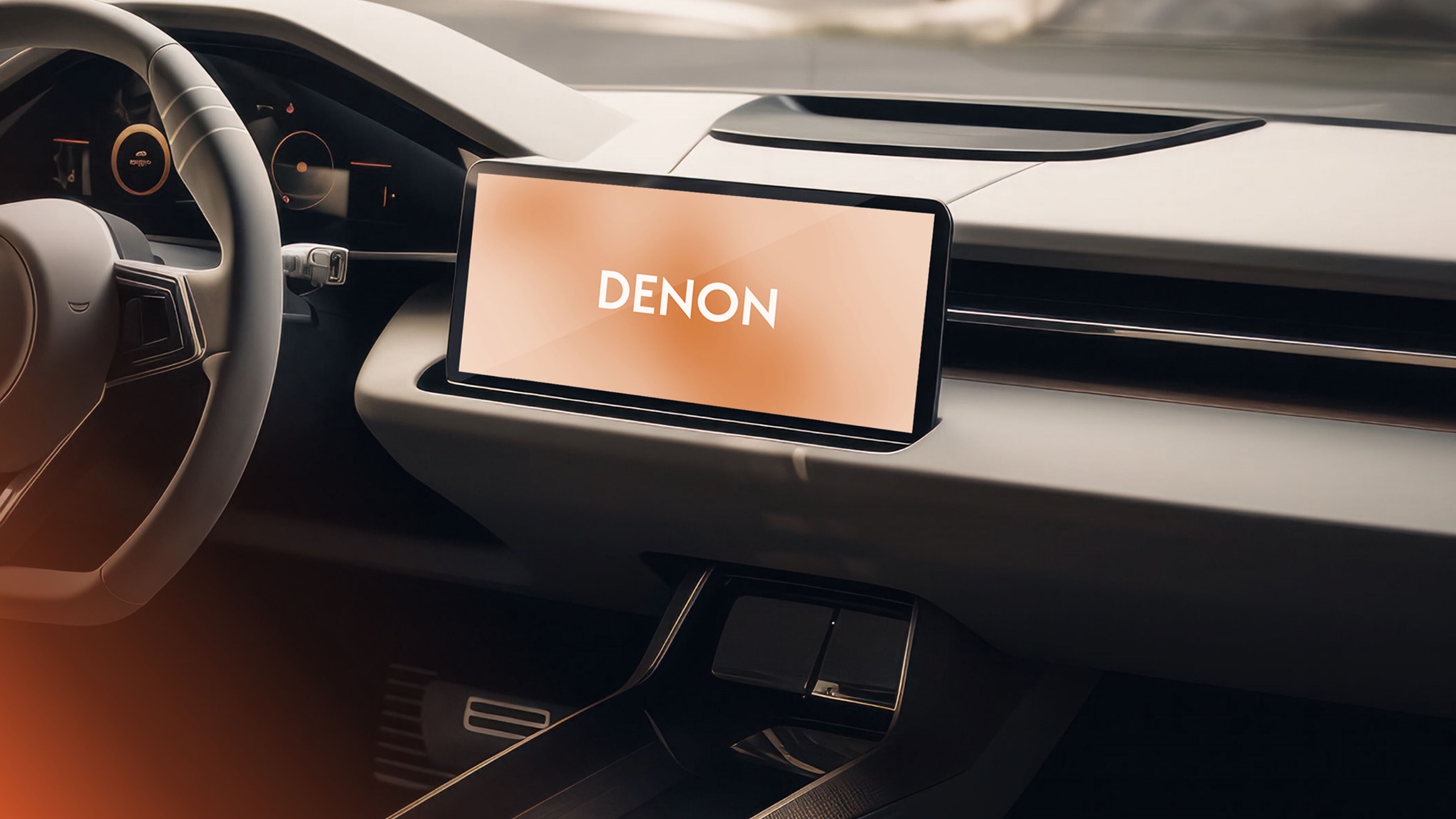
Becky Scarrott, TechRadar’s Audio Editor here, dropping by to ask you, ‘What has 22 Denon speakers, 1,800W of amplification, personalized audio for each individual passenger, a full Dolby Atmos experience and a spot in the west hall at CES until January 11?’ Why, the EV of your dreams, that’s what!
Even if the slightly beige Denon Car Audio Concept System image above doesn’t wow you (like many top-tier audio stacks, it’s better heard than seen), that significant power wattage of amplification will – and that’s not even the best bit.
This supremely immersive offering also adds sonic tailoring tech similar to Denon’s PerL Pro headphones to each passenger, tweaking the audio to each listener’s hearing profile based on otoacoustic tests. It’s something Denon’s calling “a glimpse into the future of personalized in-vehicle audio” and when you imagine 22 different drivers (including some in the headrest) all programmed to augment the frequencies you need the most, we’d have to agree: it sounds good on paper.
You can try it out yourself right now if you’re in Vegas for CES (we’re working on it, don’t you worry). If I had one, I think I’d just move into my EV full-time. Although as someone who regularly carpooled to Vegas back in the day, you’d need to remember where you sat – and no switching out the aisle seat mid-journey…
Dirty carpets? This moonwalking robovac is here to help
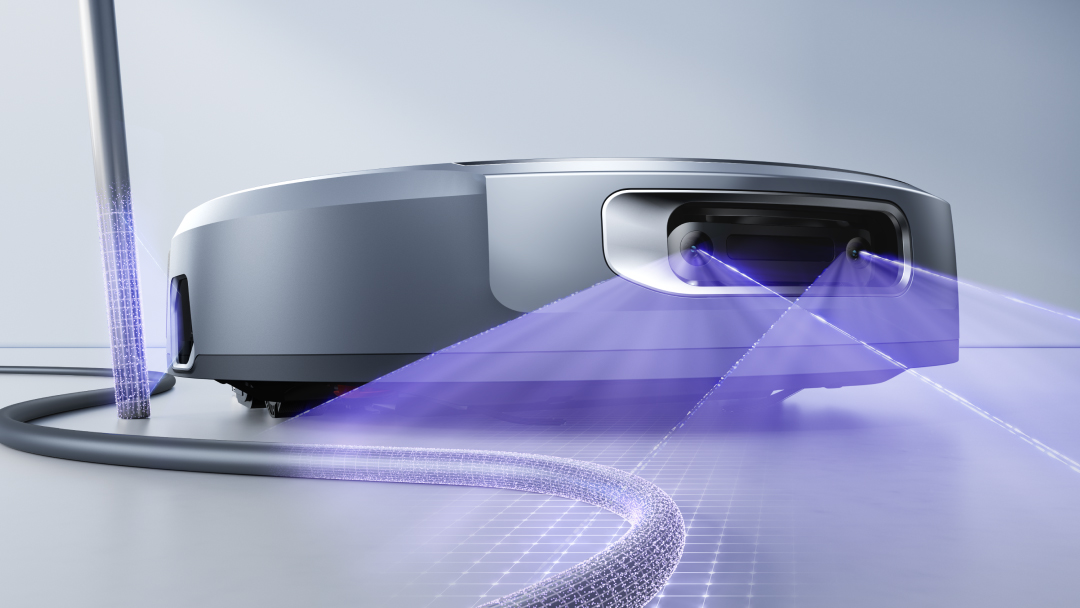
CES 2025 is packed with strange robot vacuums. Today, we spotted one that has a particularly novel way of tackling carpet cleaning – it’ll moonwalk the dust out of your floors.
Now, even the best robovacs on the market can struggle to pull dust dirt from deep-pile carpet. Narwal seems to have made it its mission to change that though, with several new features in the new Narwal Flow geared specifically towards agitating carpet fibers and getting your soft floors properly clean.
It first vacuums your carpet forwards, and then it reverses over the same spot, lifting the carpet fibers as it attacks the ingrained dust and hair from both directions. It also has a brushroll cover that will descend when the bot senses it’s on carpet, creating a vacuum (in the non-appliance sense of the word) in the area, increasing pressure and improving pickup.
Now, Narwal seems to be pretty pleased with its ‘just do it backwards’ approach, because this robovac also has a roller mop pad that rotates the opposite way to the direction of travel, and side brushes that can reverse their direction too. Is this the 2025 robovac revolution we’ve been waiting for, or a step backwards? Let’s wait and see.
Read the full story: Narwal’s new robovac will moonwalk your floors to get even the thickest carpets clean
Take that, Daleks – this robovac can climb stairs
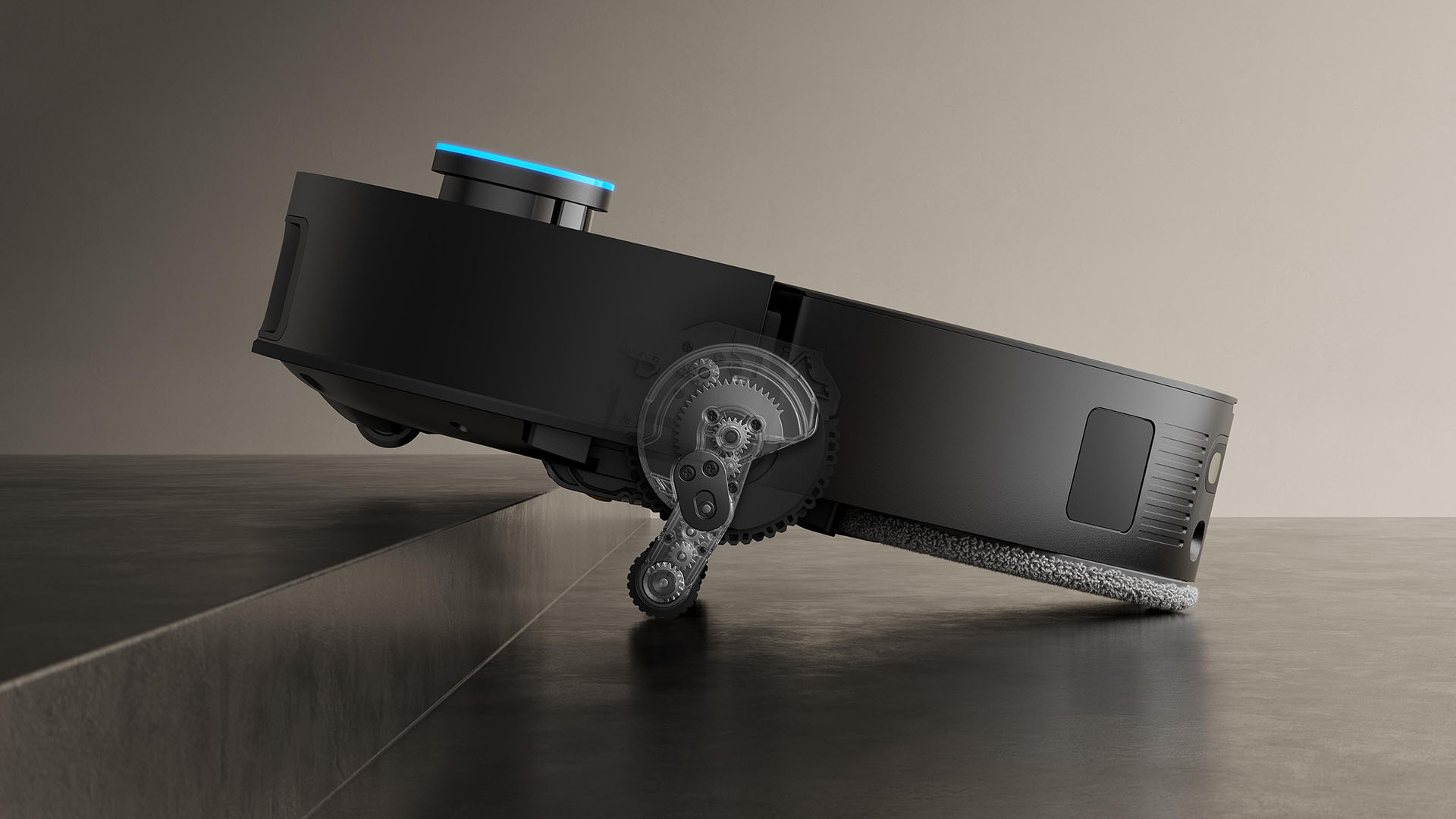
Today’s best robot vacuums are getting smarter and ever more capable, but they have always had one ultimate nemesis: stairs. Like The Doctor’s greatest foe, robot vacuums have remained bound to a single floor only. Until now. Sort of.
The new Dreame X50 Ultra Complete has tiny little feet that it can use to hoist itself up over steps. Now, it won’t be climbing the Eiffel Tower any time soon, but if you have a taller-than-usual threshold between rooms, then it should have no problem. Specifically, it can climb over obstacles up to 4.2cm in a single step, or 6cm tall in two steps, aided by what Dreame is calling its ‘ProLeap System’.
There’s a growing trend for robovac brands trying to find better ways of tackling how to get their bots over taller obstacles. Earlier in the year, Roborock released a robovac with quadbike-like suspension, and Shark launched one that that kind of twerks itself over thresholds – but Dreame’s approach seems the most dramatic, and perhaps also holds the most promise. We have a review in progress and will report back on whether it’s as effective as it looks.
Read the full story: Eat your heart out Daleks – Dreame’s newest robovac can climb stairs
Spice up your (MagSafe accessory) life
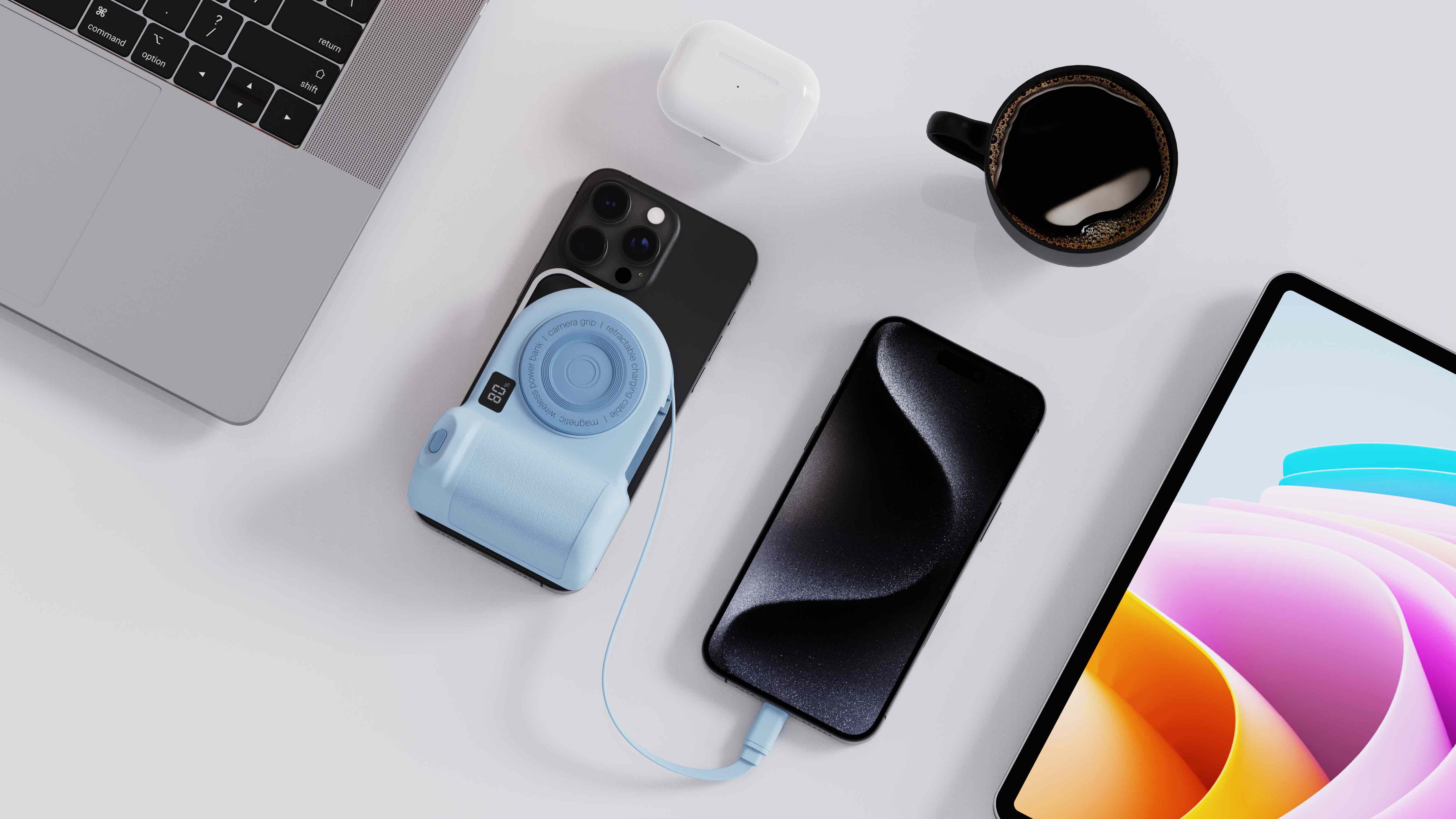
The best MagSafe accessories are powerful, reliable, and stylish – Belkin’s new Stage PowerGrip is all of those things and more.
Designed to look like a classic point-and-shoot camera, this magnetic power bank packs a sizable 10,000mAh cell, a small LED display, and offers 7.5W wireless charging for your iPhone (or slightly more powerful charging for a secondary device if attached via the included USB-C cable). There’s also a built-in button which, when paired with your iPhone’s camera app, doubles as a functioning shutter. Neat!
The Belkin Stage PowerGrip hits shelves later this year (for an as-yet-undisclosed price) in a choice of five colors: powder blue, sandbox (a sandy color), fresh yellow, black, and pepper (a dark gray).
Read the full story: This might be the coolest iPhone accessory at CES 2025, perfectly mixing tech and aesthetics
Take a hike
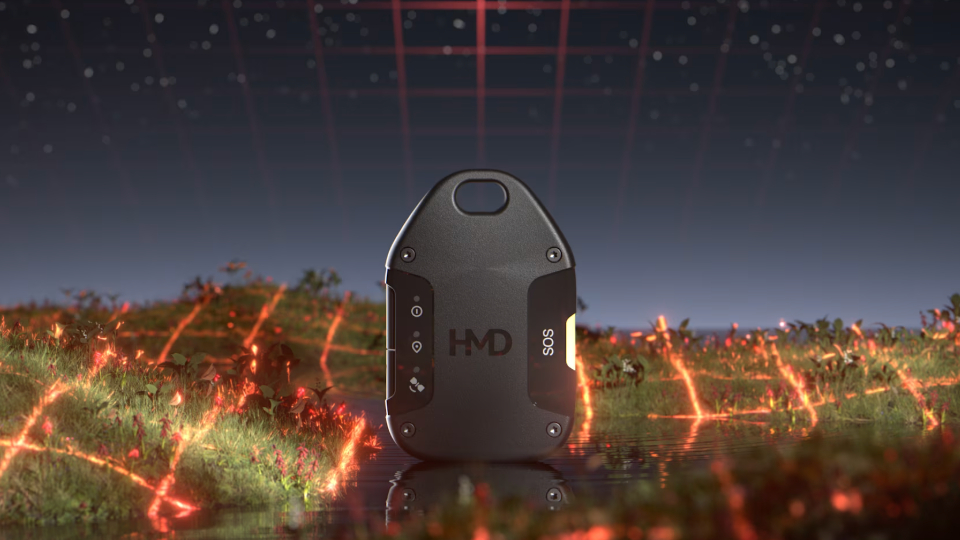
If you’re an Android phone-owning hiker, you’d be forgiven for feeling envious of Apple’s Messages via Satellite feature, which allows iPhone-owning hikers to send text messages in areas lacking cell coverage. Luckily for you, HMD’s new location tracker, the HMD OffGrid, is here to level the satellite messaging playing field.
Described by the Nokia phone maker as “cutting-edge satellite technology [that] offers off-grid connectivity with 24/7 search & rescue,” the OffGrid is a pocket-sized location-sharing device that promises to bring iPhone-style satellite communication capabilities to any smartphone, regardless of operating system.
Boasting military-grade MIL-STD-810H case durability, IP68 weather sealing, and weighing just 60g, the OffGrid is something that wouldn’t look out of place on Batman’s utility belt, and at $199 / £169, it’s also cheaper than Garmin’s comparable InReach device.
Read the full story: This Batman-style location tracker brings satellite messaging to any smartphone
Water, water everywhere…
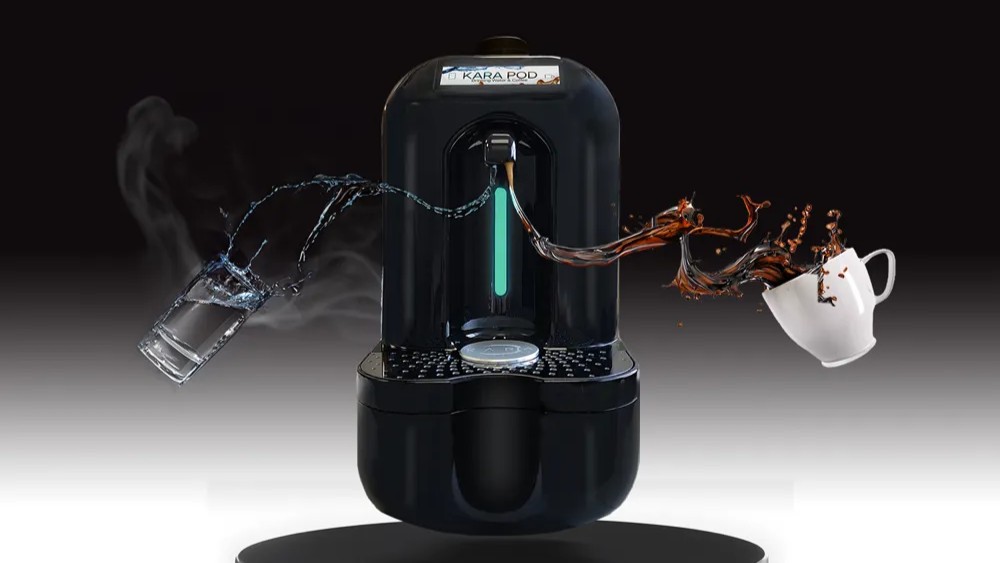
Ever feel like you’re spending too much time filling up your coffee machine’s water tank? No, me neither, but nevertheless, the water purification experts at Karawater have a solution. The KaraPod is an espresso machine that never needs its tank filling, instead using water condensed from the air in your home.
This water is cleaned and purified using heat, UV light, and replaceable filters (it’s not like drinking water from a dehumidifier, which would be a very bad idea), but there’s something weird about he idea of supping an espresso made using the steam from cooking last night’s dinner, the rainwater that evaporated from your running shoes, the vapor that you breathed out overnight, and perhaps a little toilet plume.
If you can get past that mental hurdle, it could be the brew for you.
Read the full story: This coffee machine brews espresso using water condensed from the air in your home
Looking for a cheap Ambilight alternative?
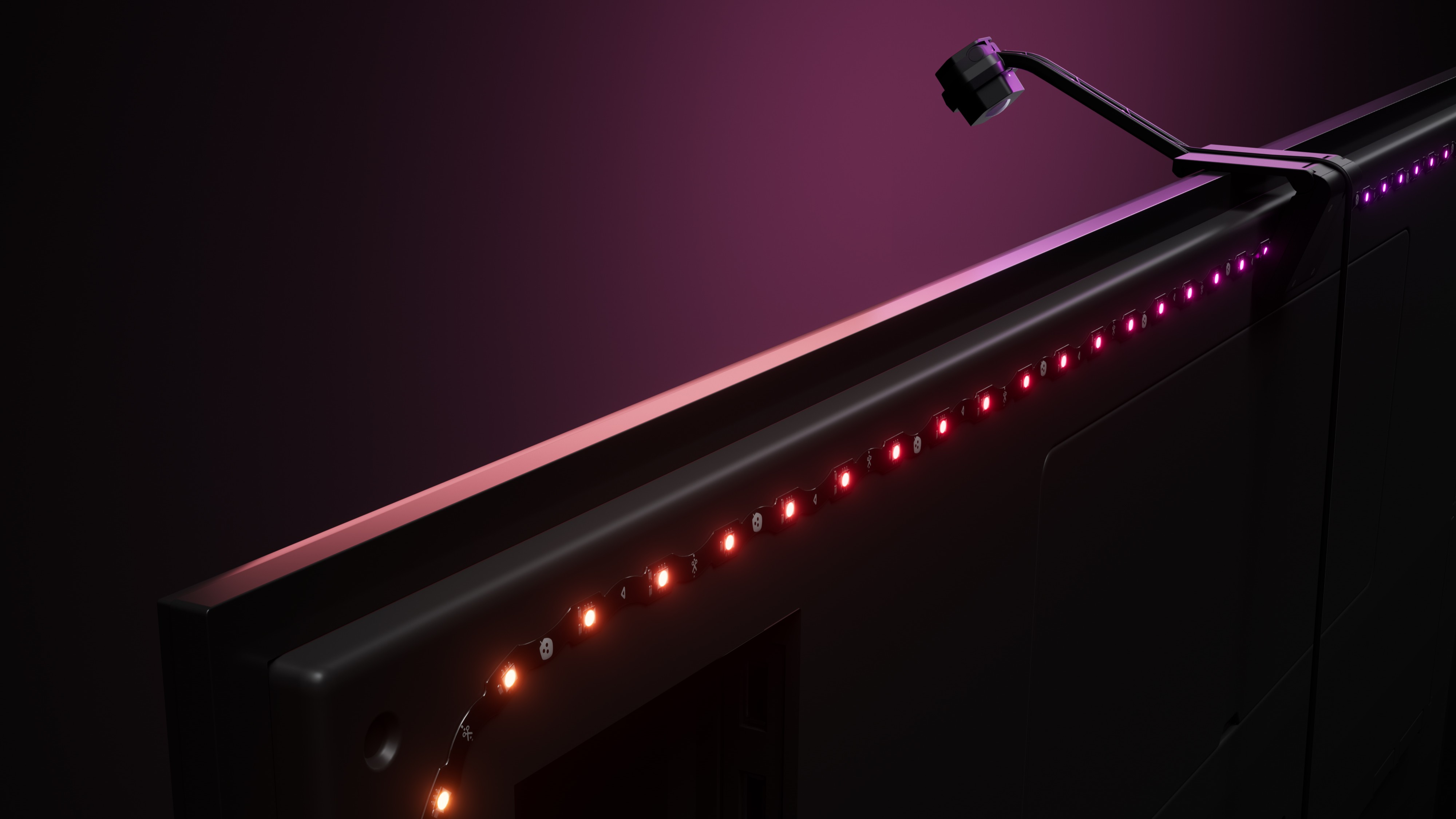
The lighting pros at Nanoleaf haven’t only released a slightly terrifying LED mask at CES – they’ve also revealed an updated version of the cheap but effective Nanoleaf 4D system. It’s a budget-friendly alternative to Philips Ambilight, which uses a camera and LED strip to detect the colors on your TV and mirror them on the wall.
Even the best Ambilight alternatives are often a nuisance to fit, requiring you to spend time on your knees fiddling about with brackets behind your TV, but the Nanoleaf 4D V2 is different. It has a lightweight, bendy LED strip that attaches directly without any brackets, so there’s less clutter and you have precious extra time to spend bingeing Netflix.
The perfect air purifier for pet owners?

Heads up: there is no way I can talk about the next product without risking a descent into childish humor. That’s because I want to highlight the Levoit Pet Odor & Hair Air Purifier – an air purifier aimed specifically at pet owners.
It detects “key substances” – which it turns out are those substances that you might find in the sort of smells made by a pet. Particularly a dog, because let’s face it they tend to be smelliest when it comes to bodily functions.
So yes, what I’m saying is, it identifies dog farts. And neutralizes them.
Of course there’s more to it than mere stinky-smell-detection, for instance a motion detection system and also a companion app, but let’s face it, it’s the dog fart stuff that has got us interested.
You’re doing good work here, Levoit, thank you.
The coolest car HUD yet?
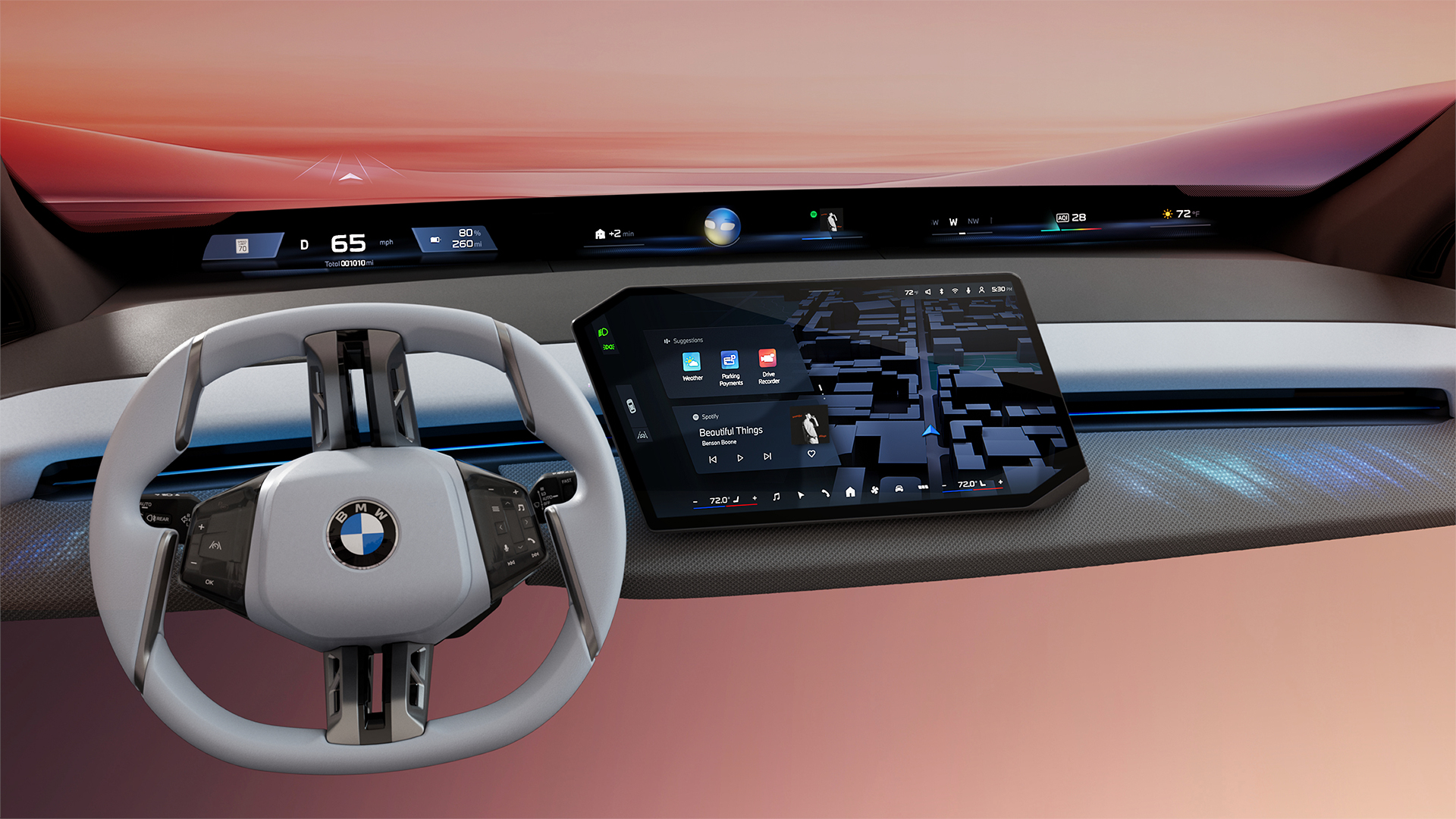
There are few things that scream ‘We’re living in the future!’ as much as a head-up display on a car windshield – apart from, perhaps, a head-up display on a car windshield that’s powered by AI.
That’s what BMW has unveiled at CES 2025, in the form of its new iDrive system, which spans the width of the windshield and beams information onto the lower section of the glass.
It will feature first in the Neue Klasse X electric SUV, but will apparently eventually appear on all of its future vehicles – which won’t necessarily please everyone. But on the plus side, it will be highly customizable, so you can drag, drop and pin your favorite applications and photos wherever you want them.
Our Editor at Large Lance Ulanoff has seen it – so check out the video below for his initial thoughts on it.
The coolest smart home tech of CES 2025
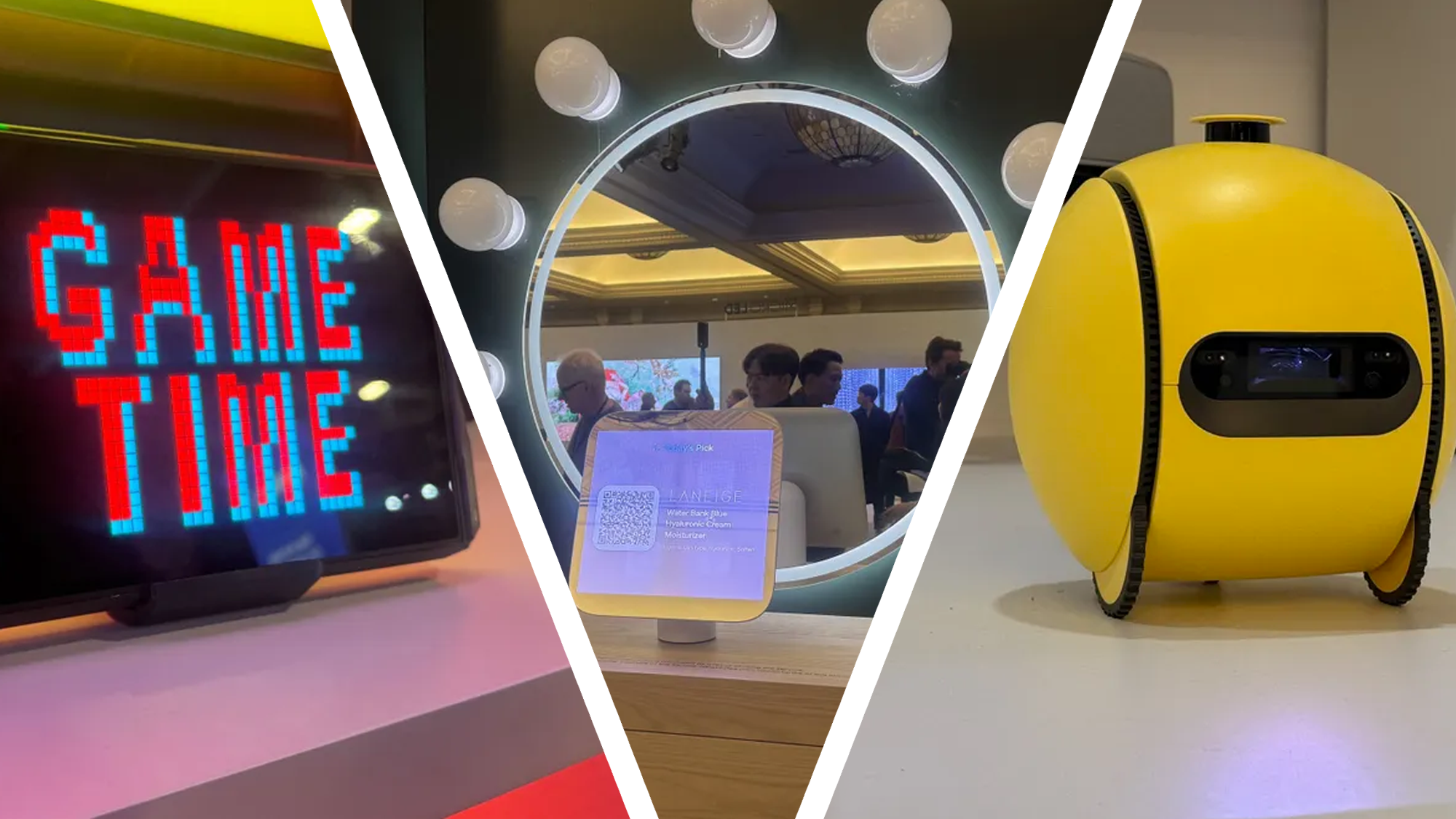
I’m still a bit dismayed at the fractured and frustrating state of the smart home in 2025, but there are glimmers of hope on display at CES 2025. TechRadar’s Managing Editor of Lifestyle Josie Watson has spent hours scouring the show floor and wrapped up her findings in a very useful guide to the best smart home gadgets at this year’s show.
You’ll find the latest multi-tasking robot vacuums (a theme of this year’s CES), but also the smartest beauty, lighting, security and home robots we met at the show. Strangely, I’m increasingly drawn to the Mirumi luggage robot and I’m not sure why…
Halloween comes early to CES
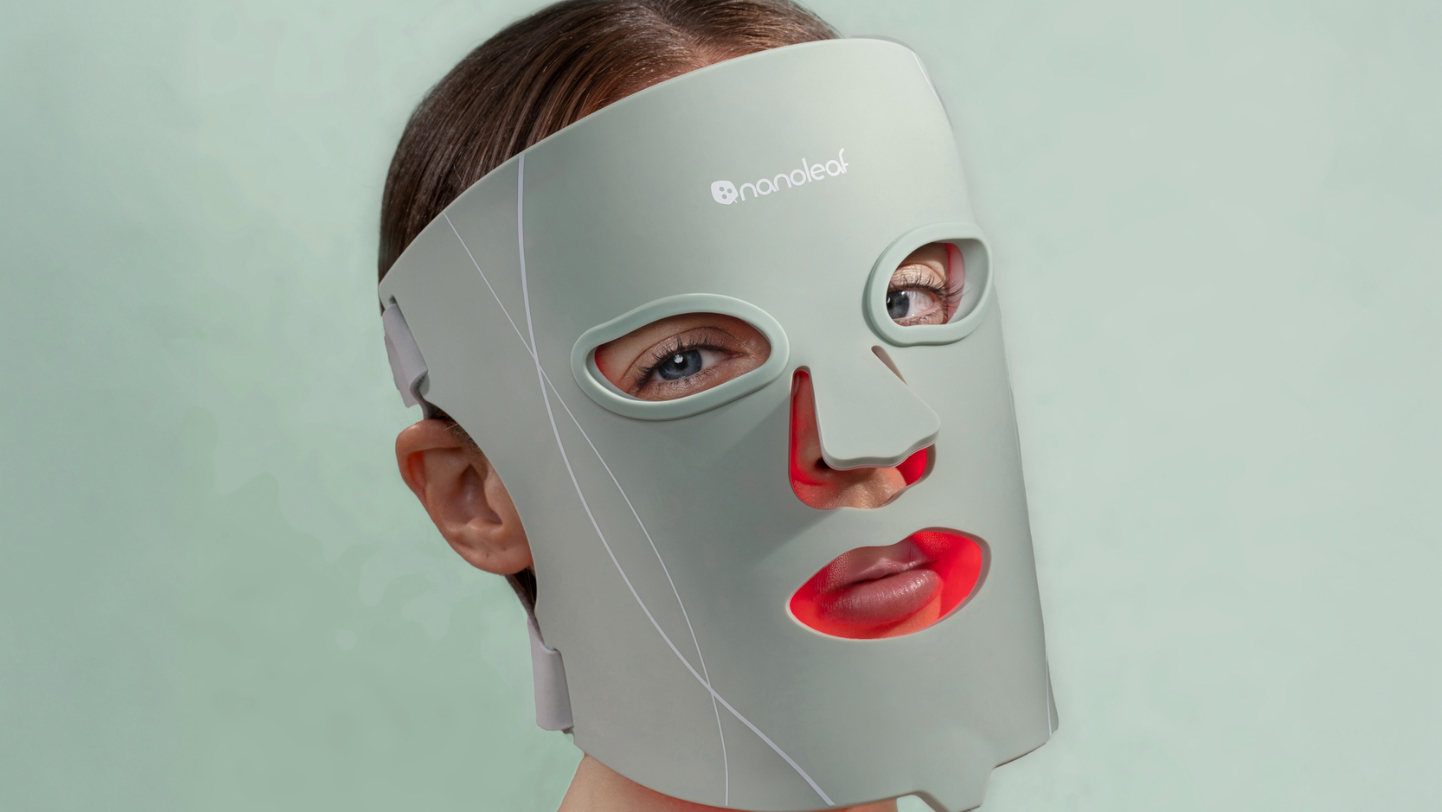
It might have Friday the 13th Halloween costume vibes, but Nanoleaf’s LED Light Therapy Face Mask has far more friendly intentions – it has several treatment modes to help treat a variety of skin conditions.
Certified by the FDA (the US Food and Drug administration), it uses both red and near-infrared light (NIR) to rejuvenate skin that’s suffering from conditions like acne vulgaris and alopecia.
It’s also surprisingly affordable compared to rivals from the likes of Therabody – you can pre-order it now for $149.99, and there’s a 10% discount coupon available at launch. UK and Australia availability has yet to be confirmed.
If only these new E Ink art frames were cheaper…

If I win the lottery this year, I’ll almost certainly buy a few of these new E Ink digital art frames that just launched at CES 2025.
Most digital frames come with compromises like annoying cables or high energy consumption, but PocketBook’s InkPoster appears to solve most of those issues. The E Ink Spectra 6 display means they look like real paper, but they also don’t need plugging in – instead, a built-in battery keeps them going for around a year between charges.
They come in three sizes (13.3-inch, 28.5-inch, and 31.5-inch), but unfortunately all are prohibitively expensive at $599 (around £485 / AU$970), $1,700 (about £1,380 / AU$2,740) and $2,400 (around £1,945 / AU$3,875) respectively. Ah well, I’m sure I’ll see one on display in a posh Airbnb soon…
The best wearable and fitness tech at CES 2025

If you’re still in January hibernation mode like me, this might be a hard read – but TechRadar’s fitness expert Stephen Warwick has compiled a very handy roundup of all the best wearable and health tech we’ve seen at this year’s CES. And there’s some really interesting stuff on show.
If you’re into smartwatches, you’ve probably already seen the news about the Garmin Instinct 3 and Amazfit Active 2 (which sit at either end of the affordability scale). But elsewhere, the Amp Fitness machine (think Peloton for cable machines) and Suunto Aqua (smart headphones for swimmers) both look like they could give be the spark my fitness engine needs in 2025. Either that, or I’ll just go touring on the Segway Xyber e-bike instead.
Behold a slightly terrifying AI-powered security camera
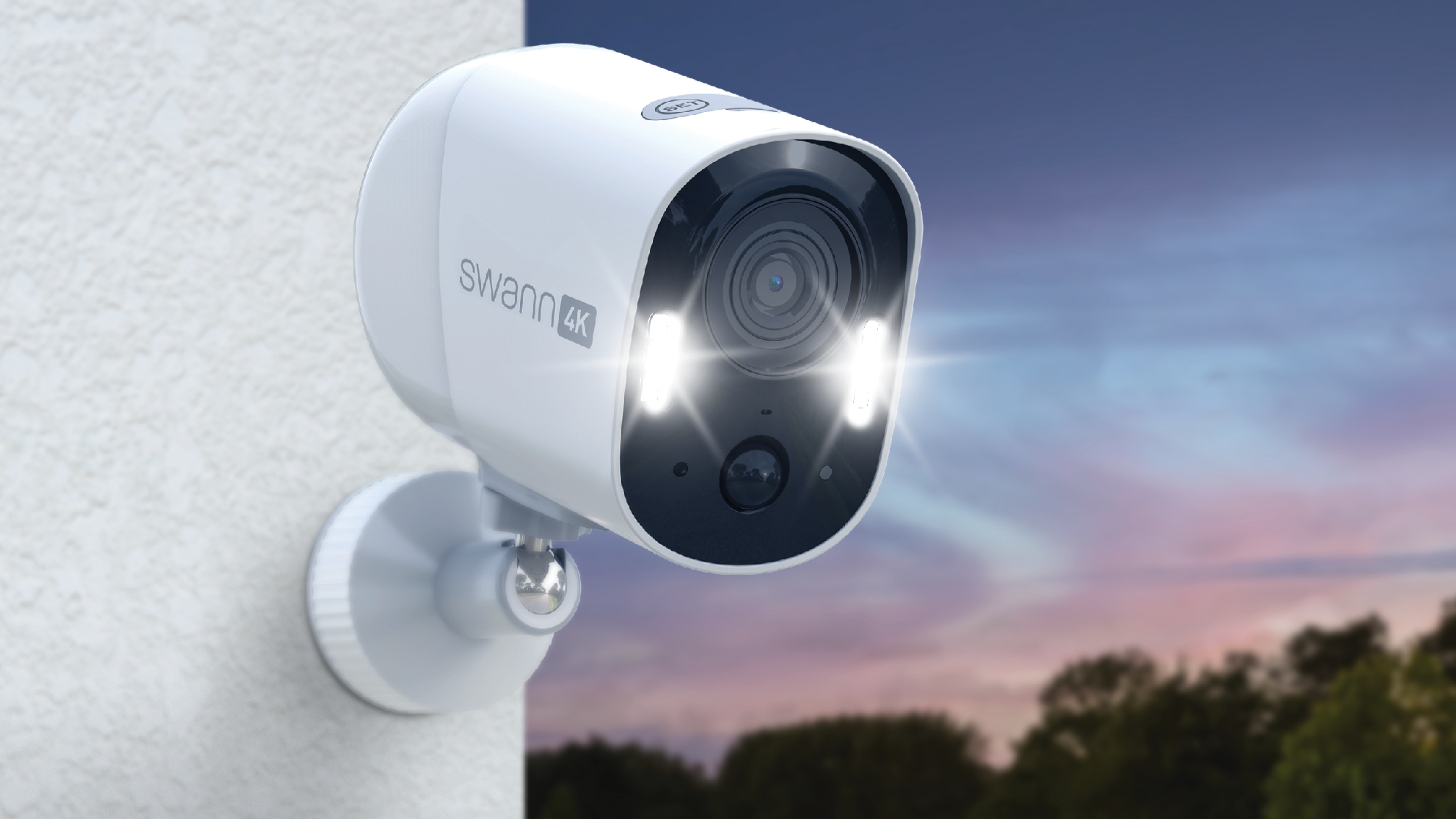
I recently set up some indoor and outdoor security cameras to guard my flat while I returned home for Christmas, but in reality they were little more than a token deterrent. The new Swann Xtreem4K with SwannShield AI Defender Security Guard (above) goes a step further though by using AI to engage with potential intruders (and visitors).
The SwannShield Defender can respond to motion and either welcome wanted guests by talking to visitors or delivery people, or “escalate if it believes there’s a security threat”. It’s not clear exactly what for that takes, but my visions of an ED-209-style “you have twenty seconds to comply” order are likely overboard.
Still, that is one use for generative AI that I could get on board with, just like the Daisy AI grandma that wastes the time of scammers.
Watch on TikTok
While we will be breaking out the news from Delta Air Lines 2025 CES Keynote that took place at the Sphere in full, I wanted to call out one highlight a bit earlier. And that’s the airline’s announcement of a generative AI assistant – that runs its own LLM – to help make the process of traveling even more manageable from the moment you book to getting to the airport, flying in the sky, and your eventual arrival.
Who knows, you may even end up taking an electric aircraft to and from. Delta is set to begin rolling this out, and in its first stage, at some point in 2025.
Forget the 136-inch TV at CES – there’s a 163-inch version

You hear about that Hisense 136-inch TV at CES that the internet’s been going wild for? That’s small fry to us – it turns out that Hisense is also showing off a 163-inch version, and yes, it’s actually planned for release. Sort of.
It’s literally a larger version of the 136-inch TV, including using Hisense’s Hi-View AI Engine X processor, and is claimed to reach 10,000 nits of brightness. The main difference from the 136-inch version other than the extra real estate is that it’s not yet clear exactly where the 163-inch version will launch, but it’s being strongly considered for the UK (borderline inexplicably).
Don’t expect to see it in stores, this will be one for the custom-install market. But what a custom installation…
A smart button that could rule them all
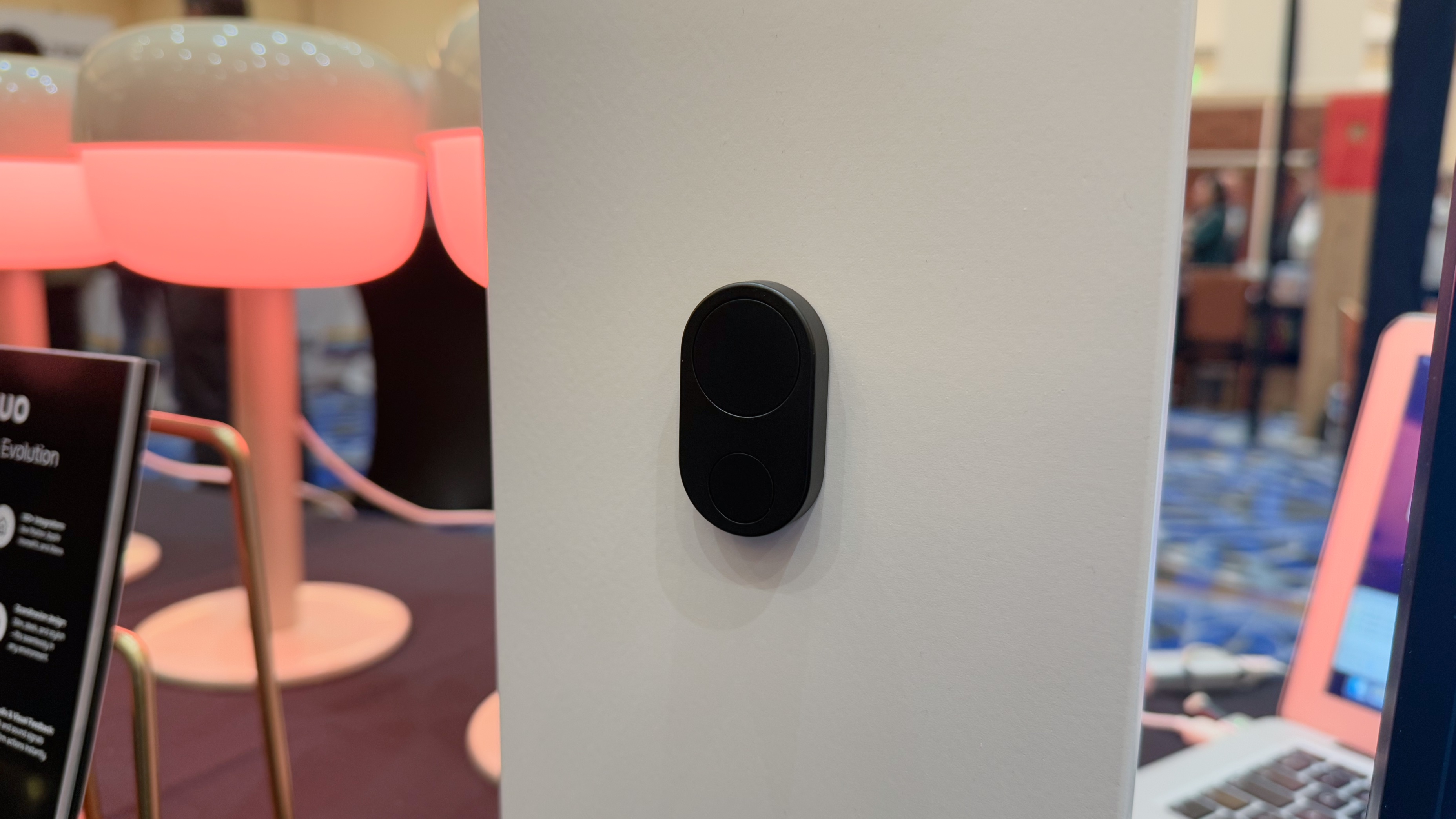
Many of the best smart home gadgets can perform more than just one task, and there is a new smart button that perfectly embodies that idea. The Flic Duo doesn’t just support the Matter smart home standard out of the box; it boasts two buttons and comes with a wall mount. This way, you can have it function as a traditional wall light switch, but the powers unlock when you take it off.
Thanks to onboard sensors, you can change the button action when you take it off the wall. Furthermore, the Flic Duo supports gestures. Allowing you to wave it around to change colors or even move it up and down to raise or lower the brightness of lights. The smart home devices and automations it can control are pretty limitless.
The biggest of big-screen TVs
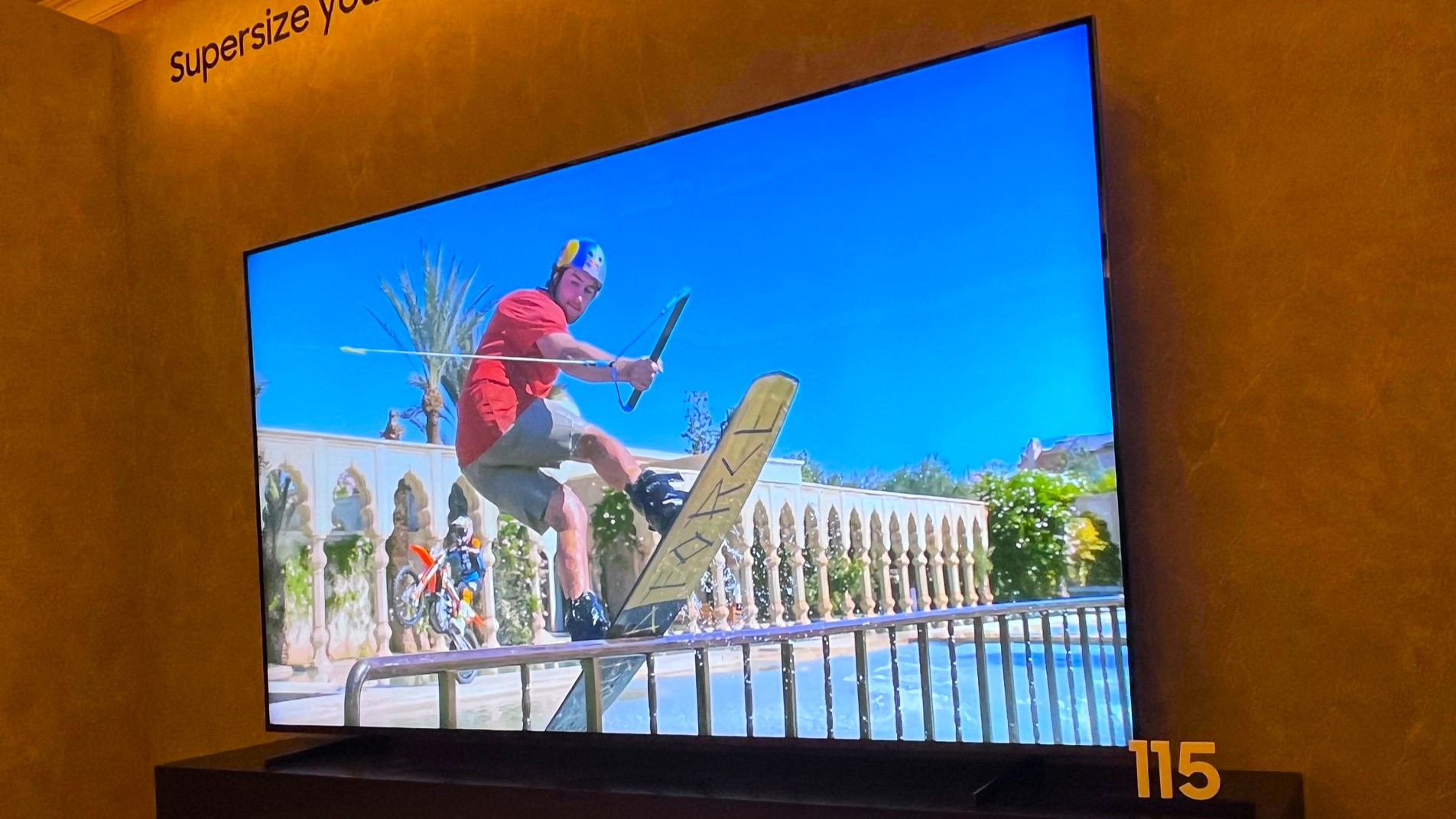
Can a TV ever be too big? Well, yes – if you don’t have the space for it. If you do, then look no further than the Samsung QN90F in all of its 115 inches of glory.
That’s right – 115 inches. But here’s the thing – it’s not even the largest set on show at CES 2025. That honor instead goes to the Hisense TriChroma LED TV, which has a 116-inch model.
Both are packed with tech, with the Samsung gaining the Glare Free anti-reflection screen from the S95D OLED TV, a 4K 165Hz refresh rate, built-in 4.2.2-channel speakers and AI upscaling. The Hisense, meanwhile, has a 10,000 nits brightness, the company claims, and a 6.2.2-channel Dolby Atmos speaker system.
Are they too big? Well yes, for most people they are. But hey, we can all dream.
Meet the world’s first rollable-display laptop!
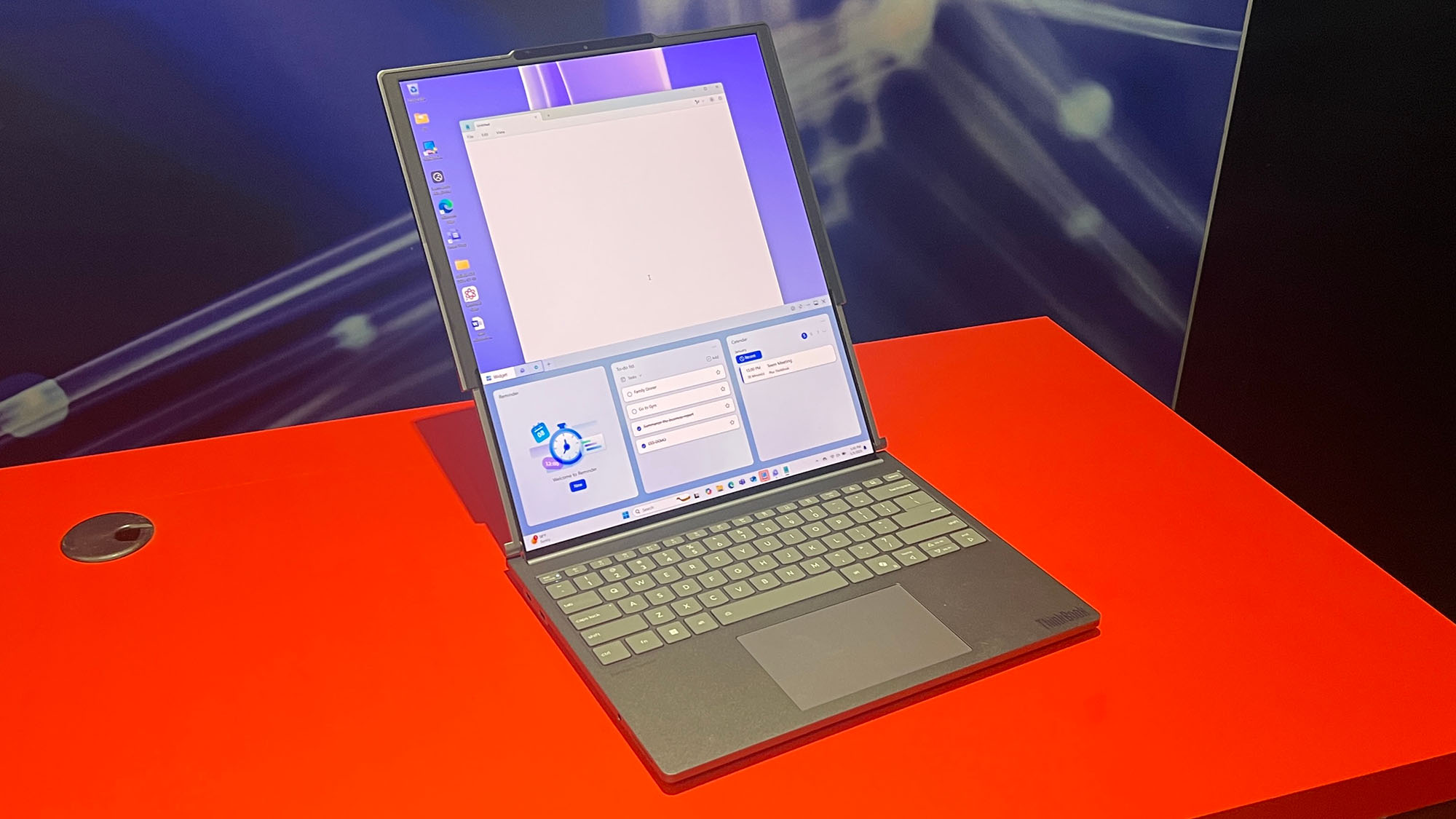
It was strongly rumored before the show, but we now have official confirmation that Lenovo has created the world’s first laptop with a rollable display.
Yes, the ThinkBook Plus Gen 6 Rollable goes from 14in to 16.7in at the touch of a button – seriously, this thing has to be seen to be believed.
Watch on TikTok
We’ll have a hands-on with it soon, but for now check out Lance’s video above plus the full details below.
A CES treat for swimmers like me
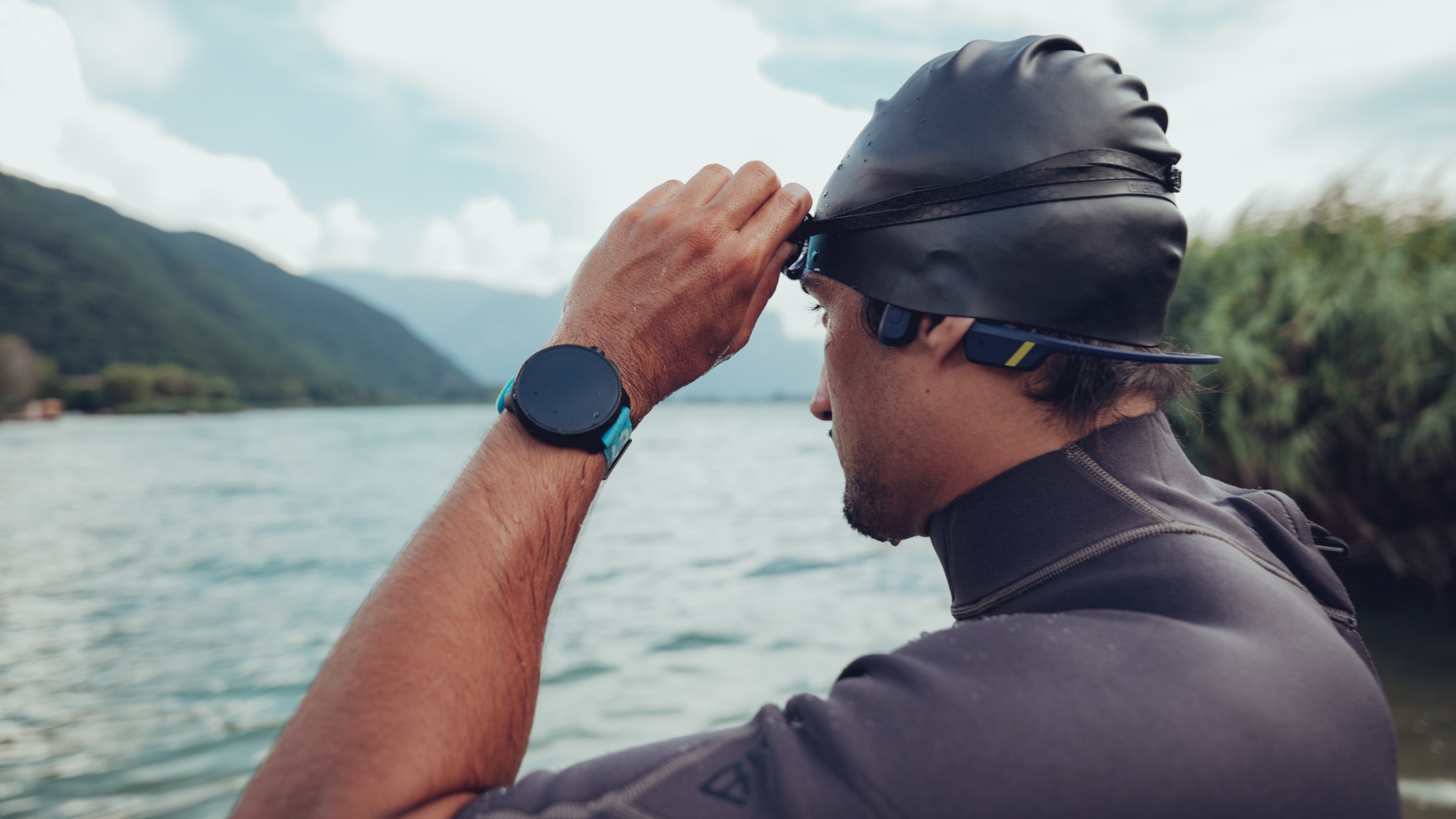
Fancy getting into swimming in 2025? Suunto’s new waterproof headphones look like a promising new companion – and are something I could have done with last year when training for my first 10km.
I’ve tried swimming headphones like the Shokz OpenSwim and accessories like the Form Goggles, but the Suunto Aqua handily combine elements of both. They use bone conduction to serve up underwater music or podcasts from the 32GB storage, and apparently use AI tech to analyze and improve your swim stroke.
That apparently includes fine metrics like stroke posture, head-pitch angle, breath frequency and glide time. Once you’re in the water for an hour or more, having some entertainment is very welcome – and I’d have certainly appreciated some tips on improving my questionable stroke efficiency.
I’m looking forward to trying the Suunto Aqua in 2025 once the UK waters warm up a bit – they’ll be available for $179 / £175 (with Australian availability to be confirmed).
It’s time – the best robot pets of CES 2025

And now for the most important part of any CES 2025 show – the robot pets. TechRadar’s Amelia Schwanke and Lance Ulanoff noticed a huge upsurge in the number of furry companions at this year’s show and they weren’t complaining.
Well, that’s not quite true. They did brand a next-gen Furby called Ropet “nightmare fuel” thanks to its combination of LED eyes, ChatGPT and a propensity to give you the cold shoulder if you don’t show it enough attention. I’m definitely getting Funzo from The Simpsons vibes from the furry Tamagotchi.
But one robot pet gave us some warmer feels – Tombot’s Jennie. As you can see in our interview below, the stuffed golden retriever is a little camera shy. But its hyper-realistic motions and gestures mean it’s a potentially idea companion for those with dementia.
In fact, I’m calling it – yes, Samsung’s The Frame Pro TV has a fancy new Neo QLED mini-LED panel, but Jennie is the real star of CES 2025 – and hopefully TechRadar’s new official mascot.
CES Day 2: the best tech we’ve seen
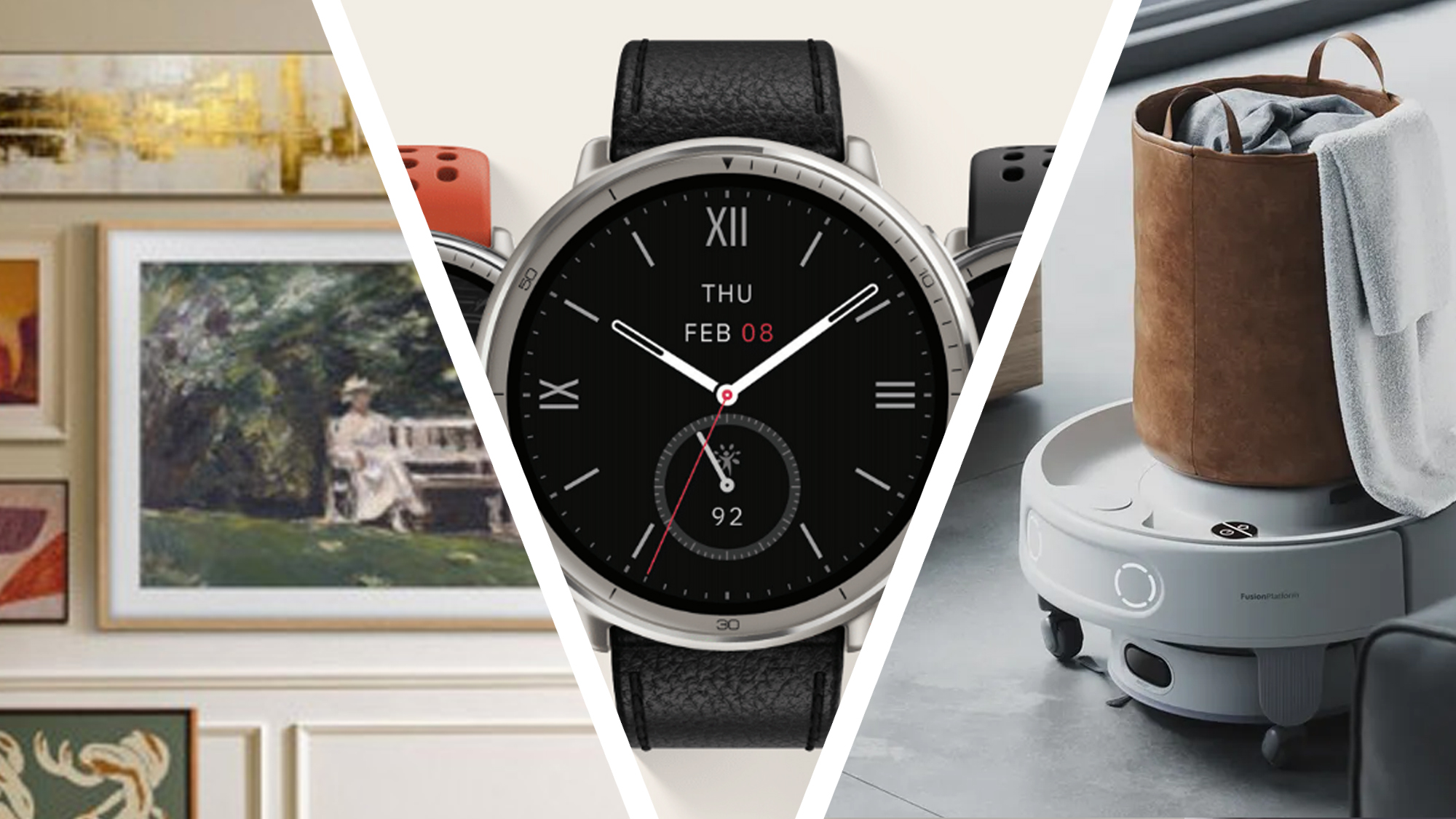
Sometimes, it’s worth pausing for breath at CES and looking back over some of the standout creations you’ve seen. That’s what we’ve just done in our CES 2025 day 2 roundup, which gathers all of our favorite gadgets from a second day of hunting around on the show floor.
There are some big-hitters our list, including our first impressions of the Samsung The Frame Pro TV (short version: it’s actually a good TV this time) and the flagship Nvidia RTX 5090 graphics card (whose price tag we’ve branded “ludicrous”, even though it’s clearly going to be brilliant).
But off the beaten track, we’ve also highlighted some more niche finds including the Dreo ChefMaker 2, which is an air fryer with genuinely useful AI recipe tricks, and the TCL Playcube, a portable projector that we’re fascinated by despite the lack of concrete details.
If you need a quick whistlestop tour of CES 2025’s second-day highlights, head to our handy roundup below.
Victrola ushers in a new ‘Wave’ of turntables to future-proof the vinyl experience
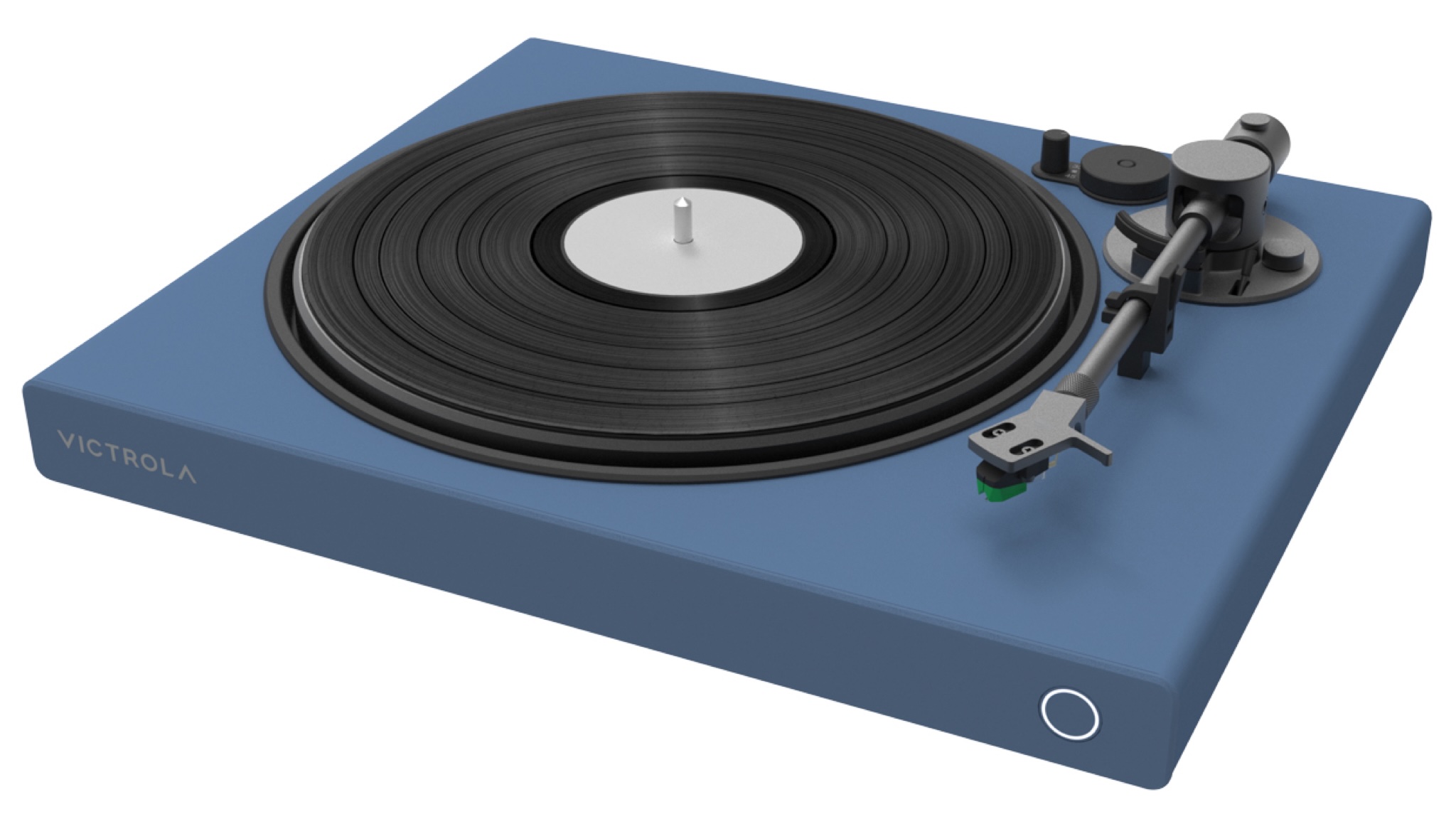
It’s not all vacuum cleaners that can deliver sandwiches and cute little cat robots whose main aim in life is to blow on your coffee at CES: no, some legacy brands are here too. And this one is calmly future-proofing your vinyl experience.
It feels apt to talk about Victrola at CES (a name made famous by Allanah Myles’ Black Velvet – which was of course written about the King of rock and roll himself, Elvis Presley) and the beloved US audio specialist has used the Las Vegas stage to showcase several new decks. But the top of the pile is its undoubtedly its new Wave turntable.
The headline grabber here is that the Victrola Wave (for that is its name) supports not only aptX Adaptive for higher-resolution Bluetooth streaming of your vinyl to compatible headphones or Bluetooth speakers, but also Auracast, the Bluetooth option for broadcasting audio to any number of devices easily.
The Victrola Wave comes in a choice of three finishes (white, blue and green) and we really hope to be able to call it in for a full TechRadar review soon. For now, we’ll head back into the show. After all, it won’t be long before the sun’s setting like molasses in the sky…
Technics’ new flagship earbuds have arrived – and our verdict’s already in
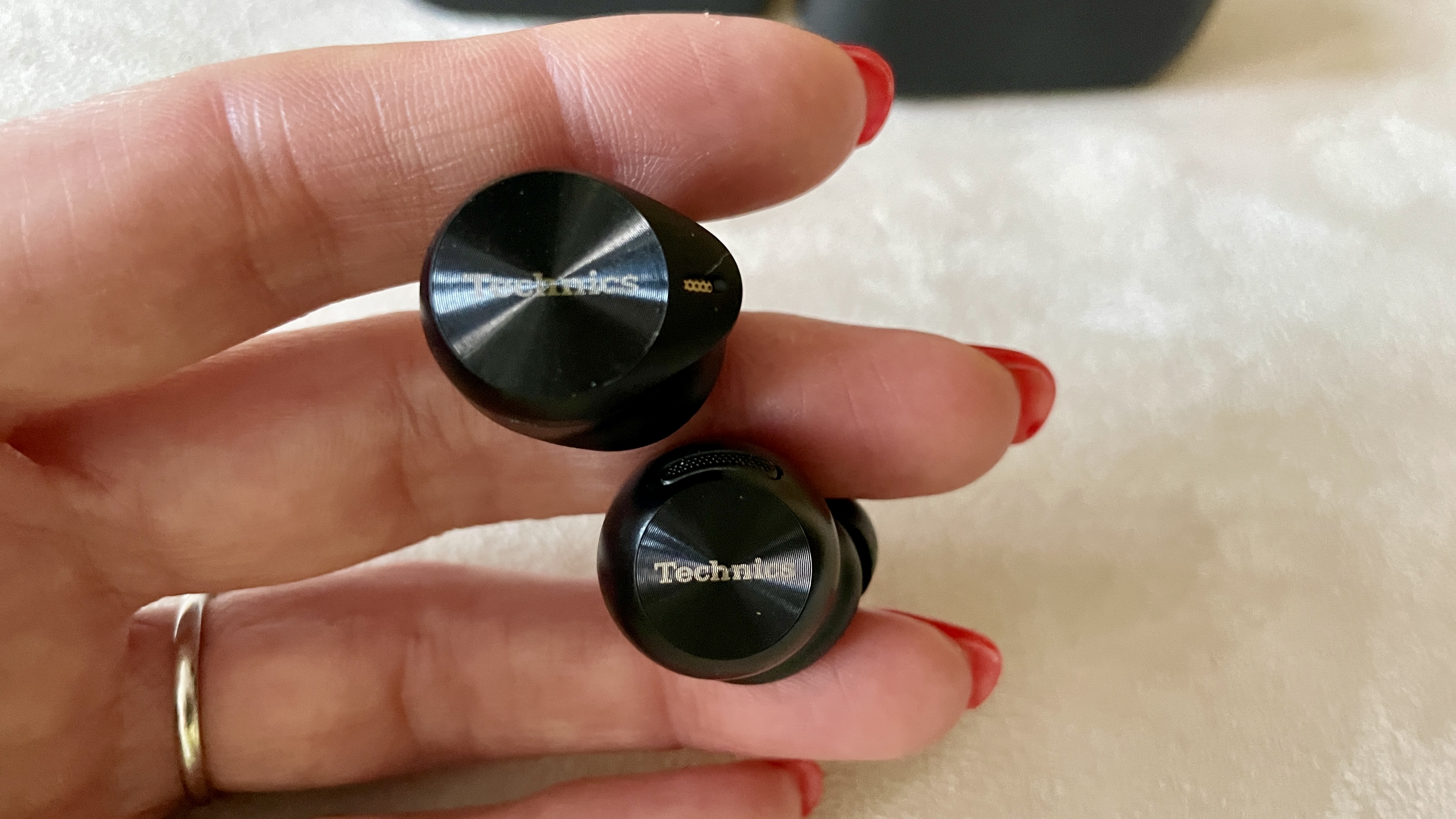
This is not just any day in the audio calendar, because the earbud you see below the superb EAH-AZ80 in the above image isn’t just any true wireless earbud. No, that earpiece on the right is one of the all-new EAH-AZ100. And they’ve just made their CES debut, thus superseding siblings which topped our best earbuds buying guide since their 2023 release.
What’s new for 2025? They’re a little smaller, as you can see in the image above (it’s thanks in part to one of the mics being moved from the top plate to the side of the sound tube) and the acoustic design now features a proprietary Magnetic Fluid Driver – yes really, there’s actually “an oil-type liquid filled with magnetic particles that is injected into the space between the driver magnet and voice coil”. (Don’t worry, Technics has done this before, in its elite wired TZ-700 IEMs, and the company assures us there’s no chance of any oily leakage from the buds – just detailed, neutral, soaring audio.)
The aim is to avoid any adverse movement of the driver snap – the shakes or shudders your typical piston-motion dynamic driver is susceptible to – or to put it another way, for that 10mm drive unit to be steadied by the fluid.
As luck would have it, not only do we have the Technics EAH-AZ100 release news covered for you, we manages to grab a set ahead of the official release so you can read our fully star-rated review. (Spoiler: it’s more good news for Technics.)
What can I say? We’re just over-achievers…
The first headphones with a touchscreen ‘remote’ are in – and we want ’em!
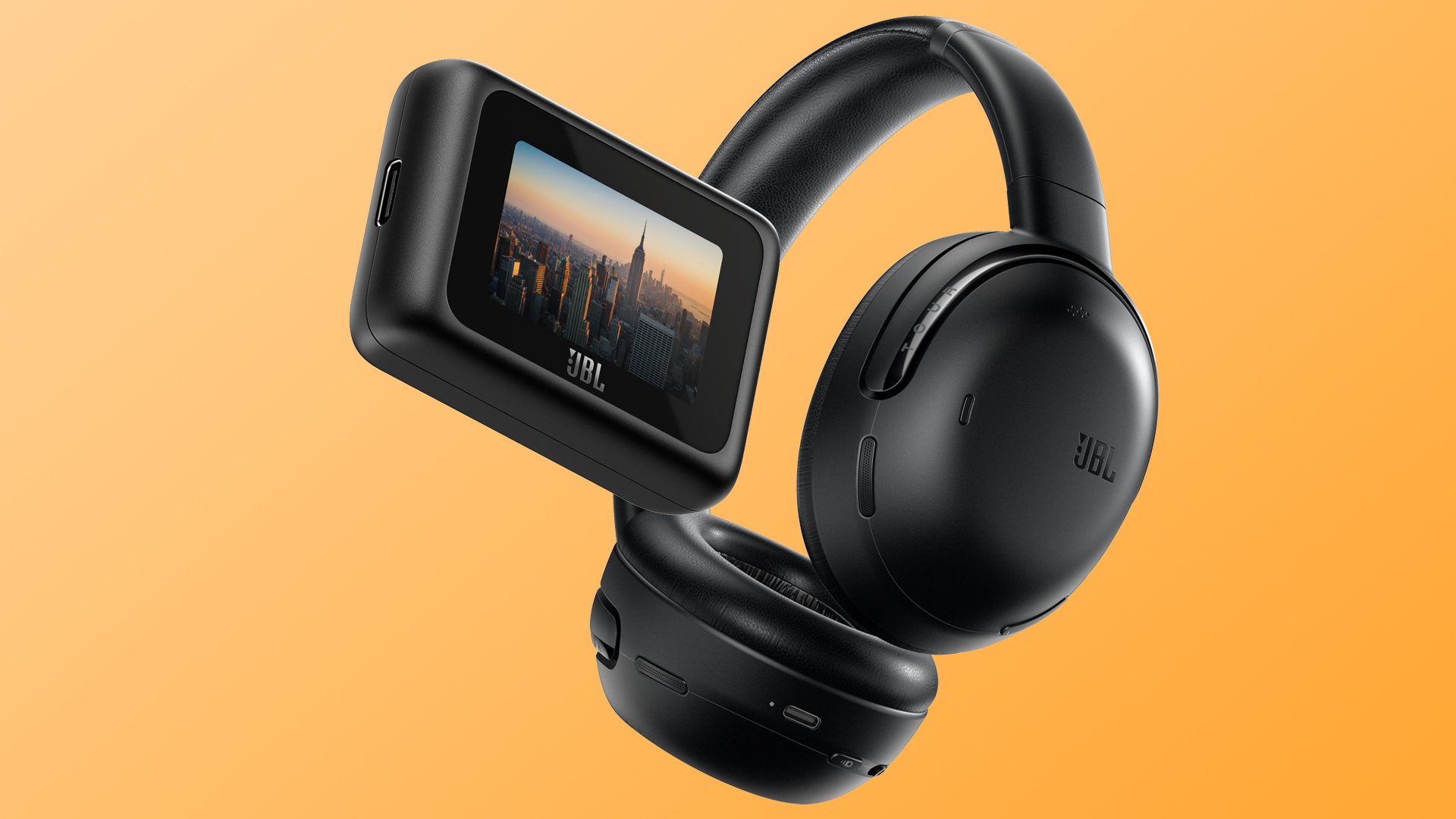
What is a huge Consumer Electronics Show good for, if not for headphones bearing their own “touchscreen audio transmitter” – a thing none of us has ever seen ’til now?
The wireless over-ears are JBL’s just-unveiled flagship Tour One M3, and the bit of kit they come with is something JBL is calling SMART Tx. It’s essentially a pocketable wireless transmitter (with a touchscreen not dissimilar to the JBL Live Beam 3 or the newer-and-upgraded JBL Tour Pro 3) that makes it easy to stream to your headphones from pretty much any audio source, and to share that audio with others via Auracast.
JBL tells me these headphones can be both an Auracast broadcast device and a receiver, thanks to the transmitter, but the cans themselves boast a formidable spec-sheet in their own right. You name it, it’s here: LDAC higher-res support from compatible devices; an 8-mic total for call-handling and ANC; Smart Talk to pause playback when you strike up a conversation; USB-C and analog 3.5mm audio options; a 70-hour battery; JBL’s own Spatial Sound with head-tracking; True Adaptive ANC 2.0; multipoint; JBL Personi-Fi 3.0 custom hearing profiles; 12-band EQ and separate optimization for the left and right stereo channels.
Pricing? Of course: the JBL Tour One M3 headphones with JBL SMART Tx will go on sale on April 13, 2025, officially priced $399.95, so roughly £322 / AU$640 (we’re waiting on confirmation for those regions, but we thought this news too good not to share).
Lenovo’s Go S gaming handheld ditches Windows 11
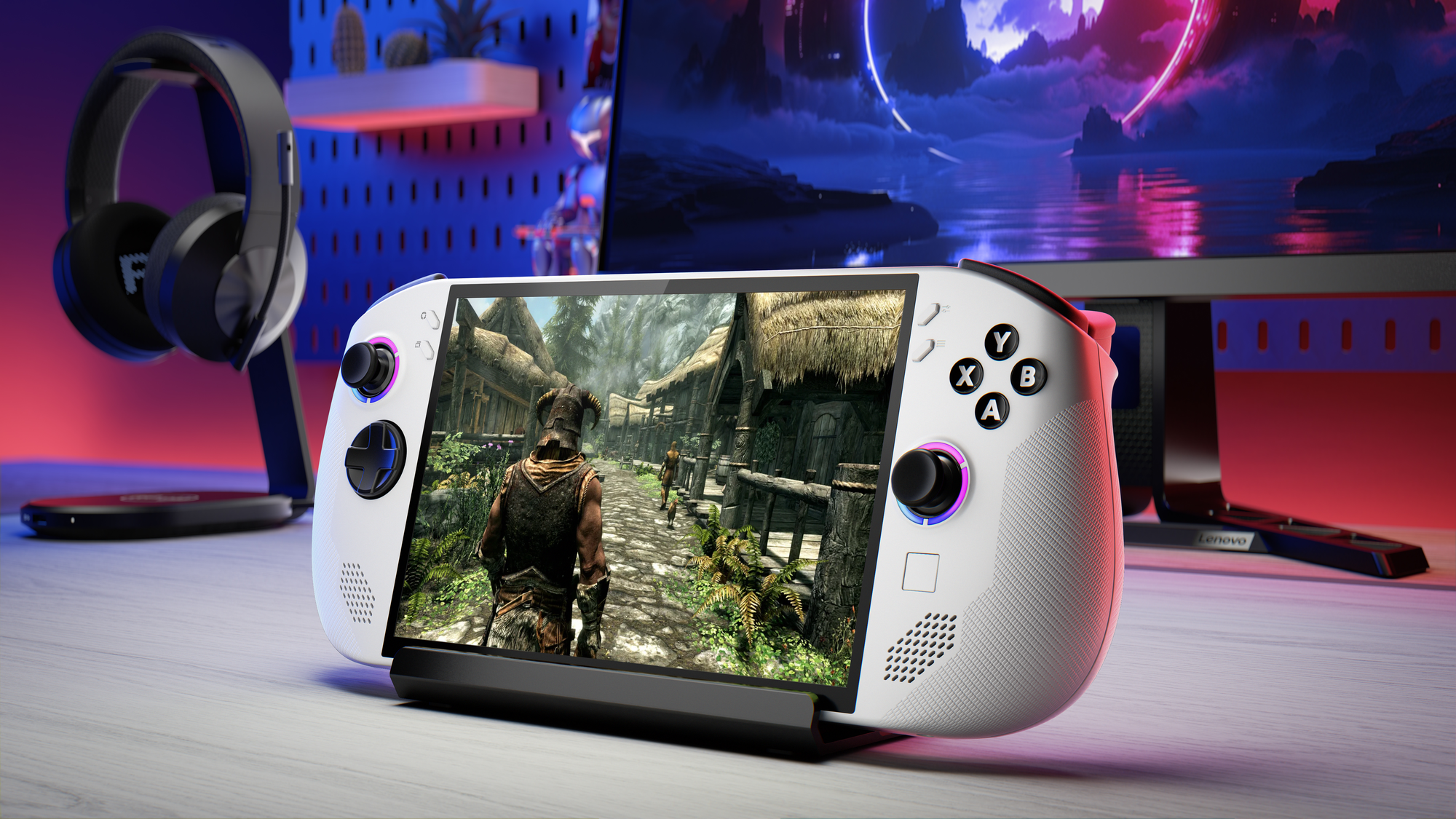
PC gaming handsets are one of the most exciting new categories of devices that have exploded on the scene since Valve launched the Steam Deck – but one thing has always (in my view) held back Steam Deck’s competitors: Windows 11.
Windows 11 is designed for PCs, which means running it on a handheld device is often a clunky affair, whereas the Steam Deck runs its own custom Linux-based operating system, SteamOS, which is designed for handhelds. However, the Steam Deck is showing its age a bit these days, and without a sequel in sight, I was worried I might be stuck with a choice between underpowered hardware or unsuitable software. Lenovo’s new Legion Go S, however, could fix that, as it’s the first non-Steam Deck handheld to come with SteamOS installed. Combining the very best mobile hardware with a solid operating system designed for handhelds could result in an absolutely awesome device – so I can’t wait to try this out when it launches.
Exciting… and heart-breaking
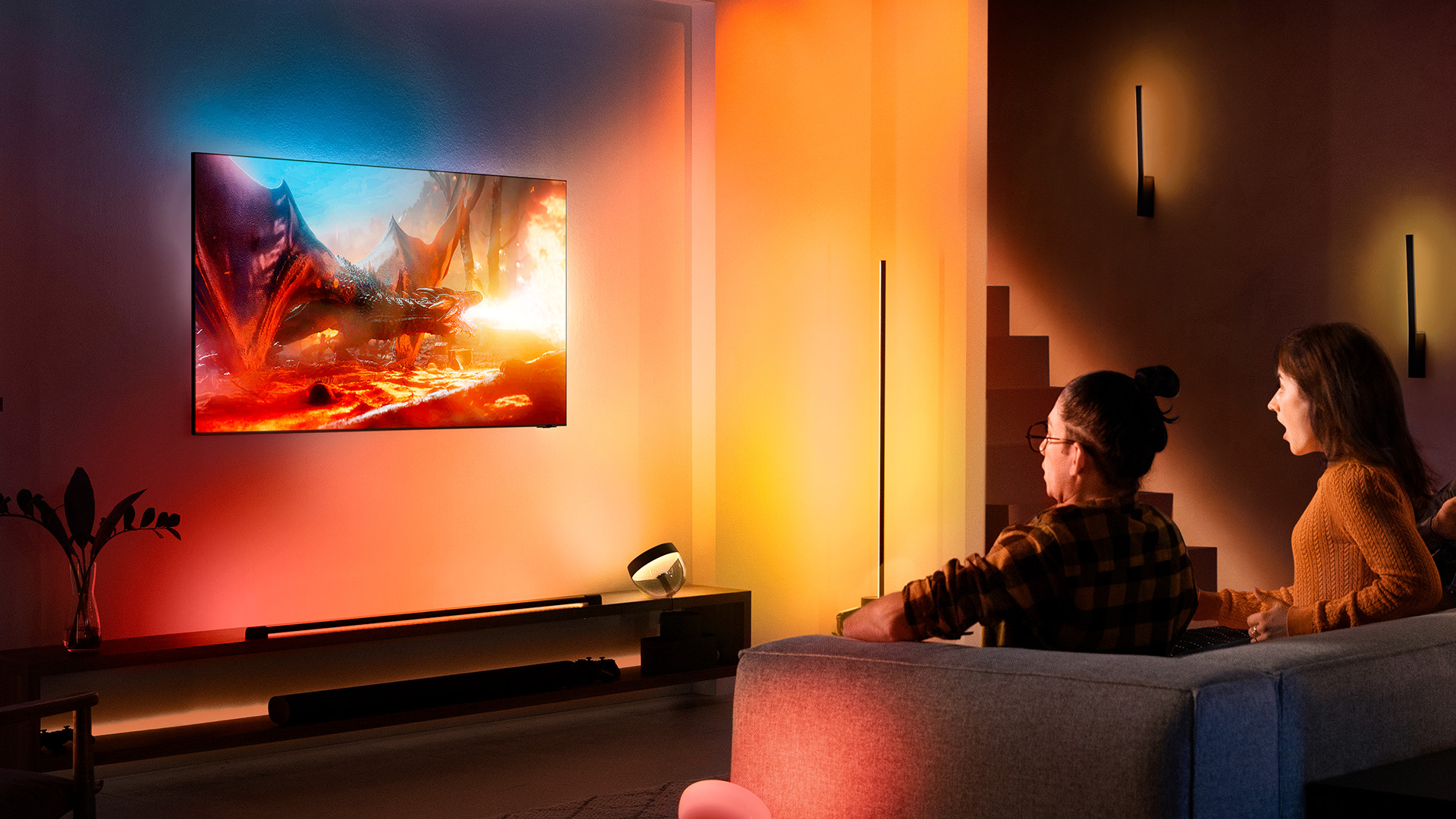
This news story from our TV expert James Davidson put me through a real rollercoaster of emotions. When I first saw the headline that LG TVs will soon be getting the Philips Hue Sync TV app I was overjoyed! I have an LG TV, plus a house full of Philips Hue smartlights, and while I love my LG TV, I was always envious of Philips TV owners due to the Ambilight feature which throws colors around your room to match with the content on screen. It’s a lovely bit of immersion-building, but if I wanted a similar effect with my non-Philips TV, I’d need to invest in the pricey Hue Sync HDMI box, which costs $249 / £229 / AU$399.
The idea of just getting an app for this that would then use my existing Hue lighting setup (including an LED light strip draped over the back of the TV) was super exciting.
Then I read the article, and my heart sank. First, the app is only coming to modern LG TVs from 2024 onwards, while my TV is slightly older. Then I saw the price of the app: $129.99 (roughly £103 / AU$205). For an app!?!?! So I’m kind of glad I can’t get it on my LG TV, as I’m silly enough to pay that kind of money. Oh well.
Could insect-watching be the next bug… er, big thing?

TechRadar’s Editor at Large and birdwatching enthusiast Lance Ulanoff has been won over by a pair of new launches from Wonder – the brand behind his beloved Bird Buddy. The Petal looks (kind of) like a big yellow flower, but inside is a HD camera with a 1/1.9 inch sensor, capable of shooting 12MP stills. This can be placed using a bendable stem, while a solar panel disguised as a leaf ensures it doesn’t run out of charge.
While the stem can be wrapped around anything you like in your garden, if you really want to get into nature-spotting even further, you could pair it with one of the brand’s new Wonder Blocks. This modular habitat system can be customized to attract different kinds of wildlife – you could plant flowers and watch for bugs, or invite bees to nest, for example.
Just like with Bird Buddy, the camera captures photos and videos of the birds and insects that come to visit. It then sends them to the Wonder app, which uses AI to identify them, so you can get to know your garden’s inhabitants a little better.
This drink-cooling robot cat might be cutest gadget of CES 2025

Along with your TVs and graphics cards, CES always delivers plenty more unusual gadgets, and the prize for this year’s cutest bit of tech goes to the Nékojita FuFu. This dinky mechanical cat clings to the top of your cup, and blows on your drink to cool it down to sipping temperature.
The FuFu (an onomatopoeic name meant to mimic a person breathing) comes with a range of different blowing modes. Currently, these include ‘The Princess’ (slow, steady breaths) and ‘Look at That!’ (which gets increasingly stronger). These modes are randomized, to make this coffee companion seem more lifelike.
This is the work of Yukai Engineering, which has built something of a name for itself when it comes to gadgets that walk an unsteady line between appealing and just plain weird. This year, it’s also showing a furry creature that’ll cling to your bag handle and watch people as they go past, and previous CES showings include a cuddly toy that nibbles your fingers.
Is this the future of immersive experiences?

If I had the choice of game/TV show to try in immersive-experience form, it wouldn’t necessarily be The Last of Us. The superb PlayStation horror/HBO thriller is terrifying at the best of times, so actually living it… well, no thank you.
Our Senior Staff Writer Hamish Hector is clearly braver than I am, though, so he took one for the team and stepped into the world’s first interactive The Last of Us exhibit at CES. And he died. Of course he did. But he had fun, and that’s the main thing, right?
We’re not sure if this well ever end up being more than a tech demo, but as Hamish says, it was “a super awesome experience. I loved the blending of real and virtual elements to create an immersive interactive story that felt like you were thrust into the game world.” Here’s hoping it’s made available to a wider audience at some stage.
Instant CES Day 1 catch-up
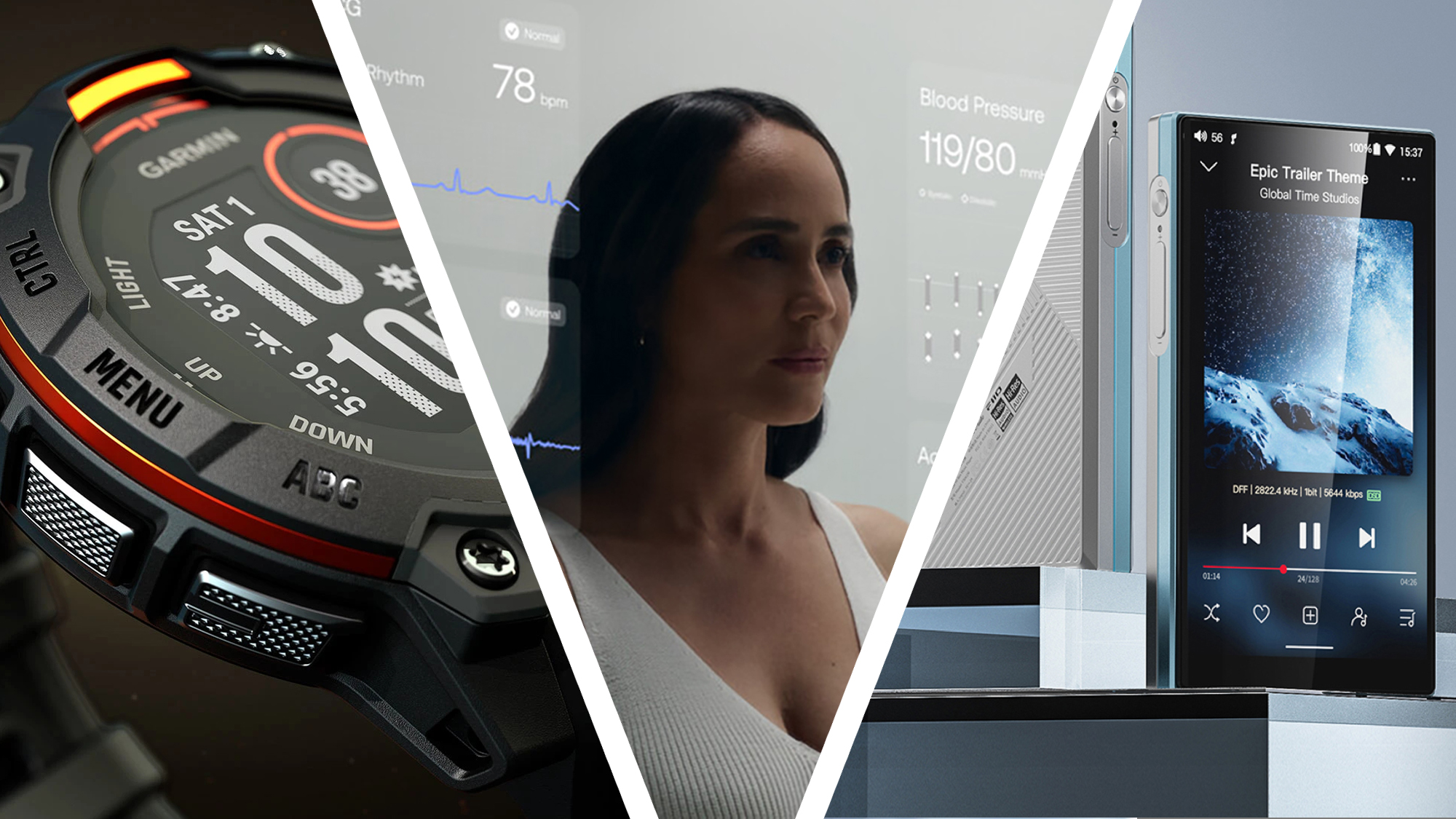
Need a quick primer on everything you’ve missed over the first day of CES? We’ve pulled together our round-up to CES 2025 day 1: featuring the 11 best gadgets we’ve seen so far.
And there was plenty of it – from smart glasses to smart rings, hi-res audio players to OLED TVs and – inevitably for CES – robots. Lots of robots.
First climb: Garmin’s new Instinct 3 smartwatch

CES is tiring at the best of times, but TechRadar’s Editor at Large Lance Ulanoff really went above and beyond to try out the new Garmin Instinct 3 in Vegas.
The Instinct 3 is the latest version of Garmin’s popular outdoor smartwatch, and brings with it either a new AMOLED display or a new solar-powered screen, new metal-reinforced bezel and a built-in flashlight, among other upgrades.
And of course it tracks multiple activities – including climbing. So what else could Lance do but give it a go…
Check out the video above to see how he found it, but it case you’re worried, he made it back to ground safely.
First listen: LG’s impressive new Bluetooth speakers
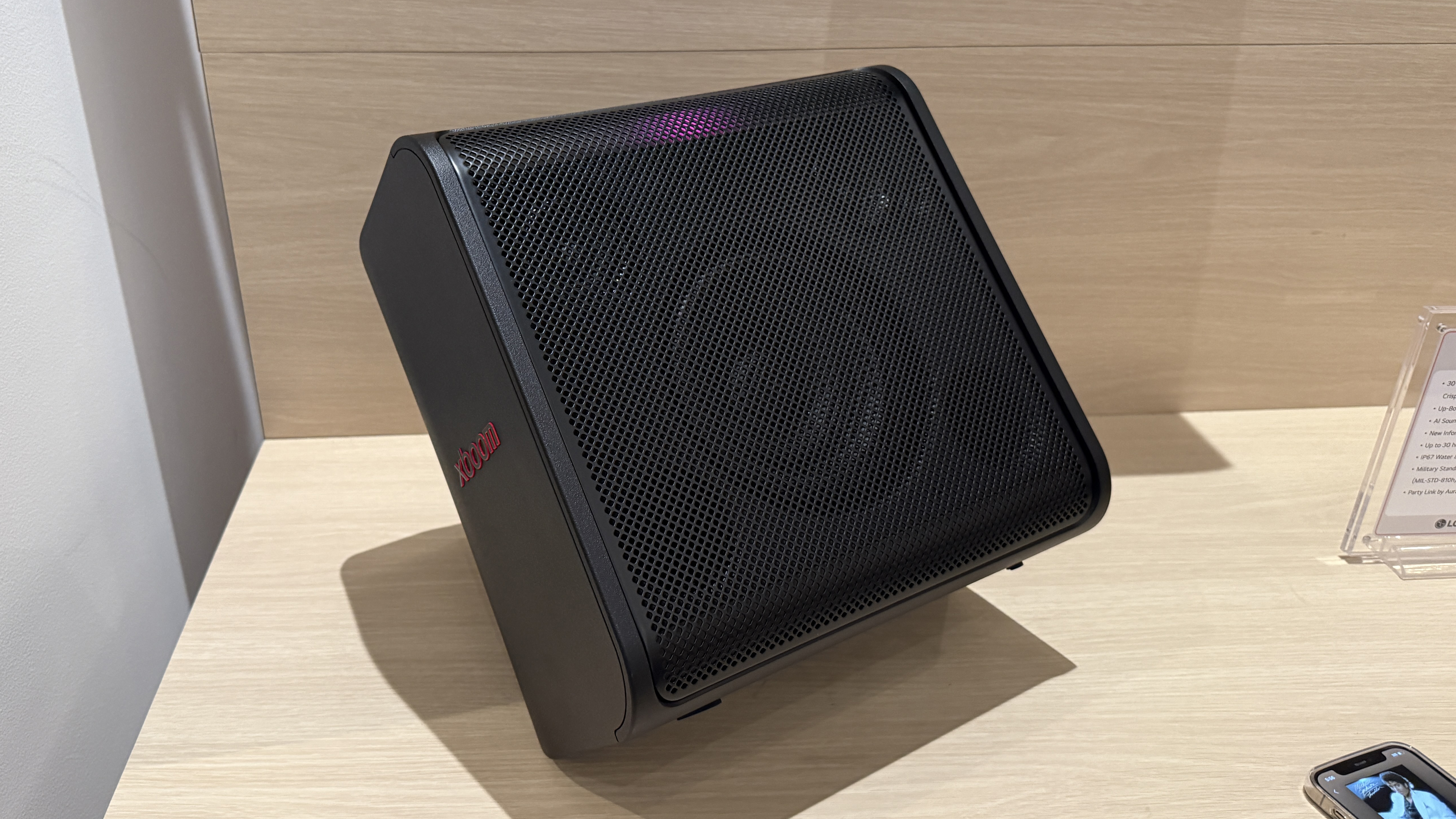
Here’s a slight surprise from the CES 2025 show floor – a celebrity tech collaboration that’s actually good. LG has announced a new range of Bluetooth speakers made in collaboration with will.i.am and they’ve surprised TechRadar’s Managing Editor of Entertainment Matt Bolton by offering “big, beautiful sound and a smart design”.
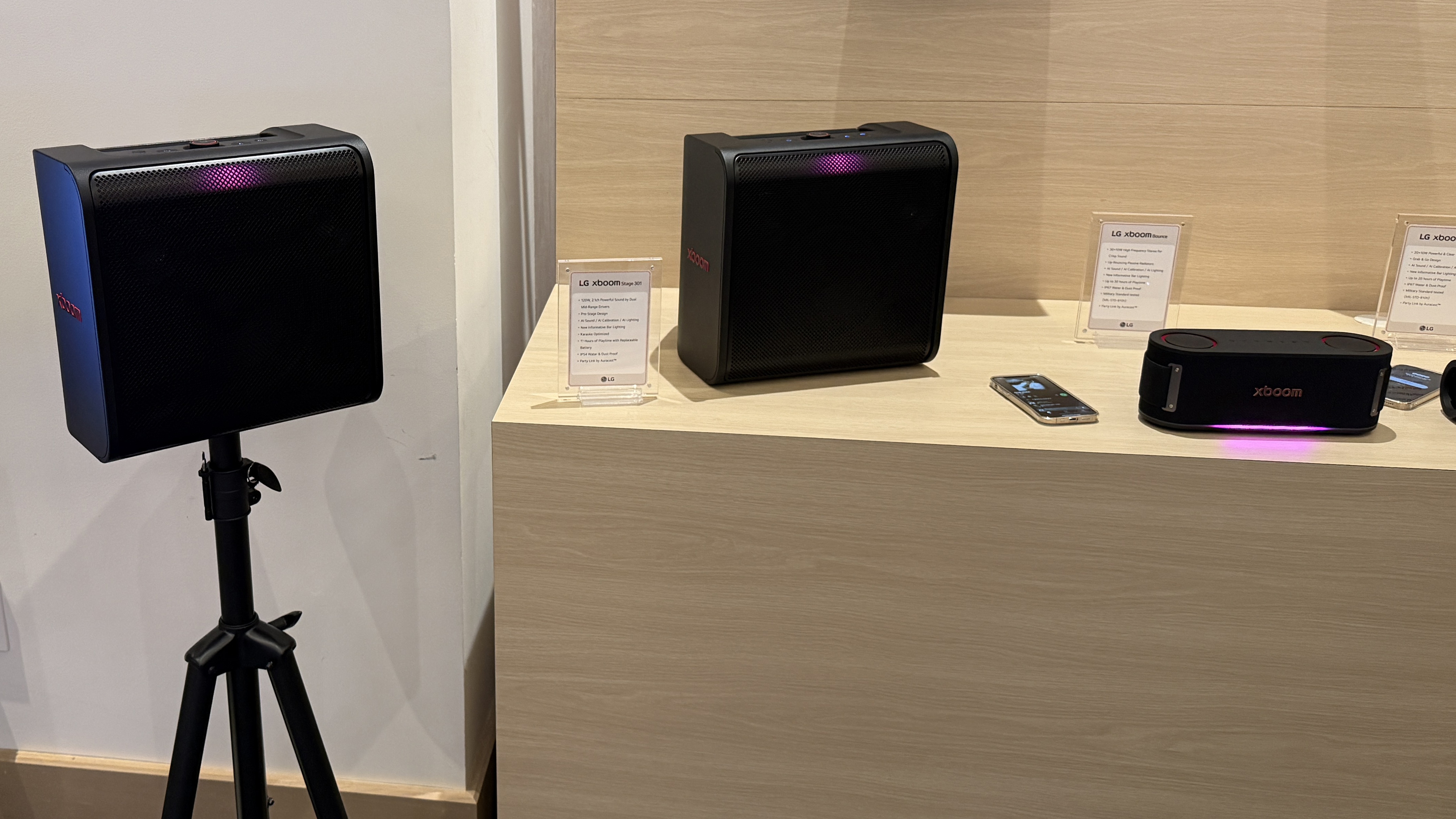
The new xboom speakers are a range coming in different sizes, but the star (to our ears) was the LG xboom Stage 301 (above) which is designed like the stage speakers you see at concerts. It can also sit on a stand, so you can use it with a mic for karaoke, busking or just as a big party speaker.
In our demo we found it delivered “really full bass that felt suitably deep but not overwhelming at all, and with tons of space for the rest of the music to leap out at you”. You can read our full report on the whole range below.
Nvidia reveals the planet’s most powerful consumer graphics card
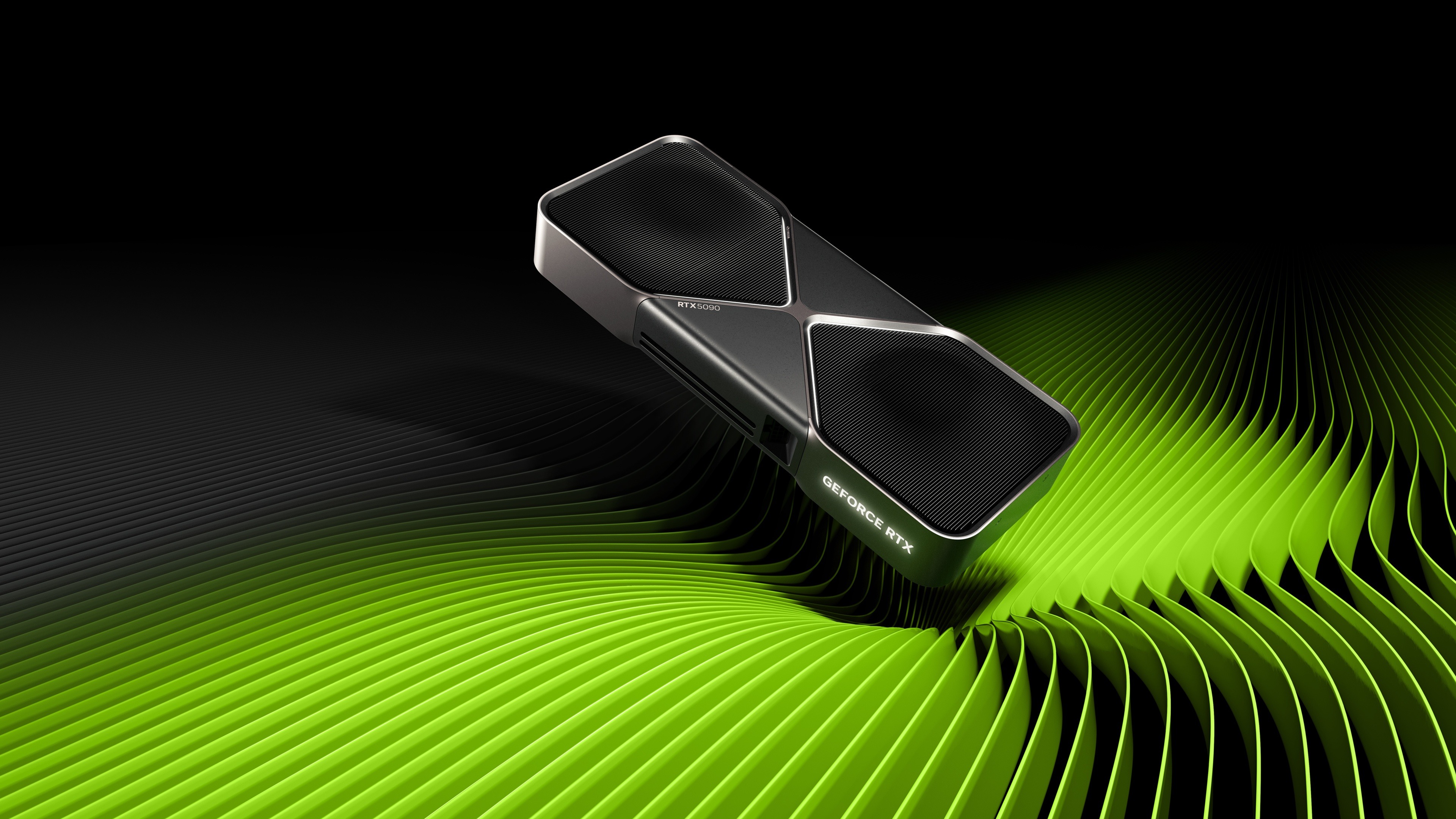
It wasn’t exactly a surprise after months of leaks and speculation, but Nvidia CEO Jensen Huang (in perhaps his finest leather jacket so far) has finally revealed the RTX 5000 series graphics cards at CES 2025 – and put AMD and Intel firmly in the shade.
As TechRadar’s Computing Editor Christian Guyton noted, “it might not be called the Nvidia Titan RTX, but the RTX 5090 might as well be”. The flagship card’s specs are astounding and, frankly, so is the price at $1,999 (£1,999 / AU$4,039). Too much for a ‘consumer’ graphics card? Read our full report to make up your mind…
The ‘greatest gadget we’ve seen at CES’ so far?

It’s a bold claim, but TechRadar’s Homes Editor Ruth Hamilton makes a strong case for the Switchbot K20+Pro being the finest thing, in pure gadget terms, we’ve seen from CES 2025. It is, after all, a vacuum that can clean your floors, but also act as your air purifier, security camera and sandwich deliverer.
Like the SwitchBot K10+ Pro, this new model is a Lidar-powered modular bot that can have different SwitchBot appliances stacked on top of it. That means you can add a security camera, fan or a clip-on tray to deliver you anything up to 8kg in weight. It’s been a long time coming, but a Jetsons-style home robot could finally be close…
Eyes-on with Samsung’s new The Frame Pro TV
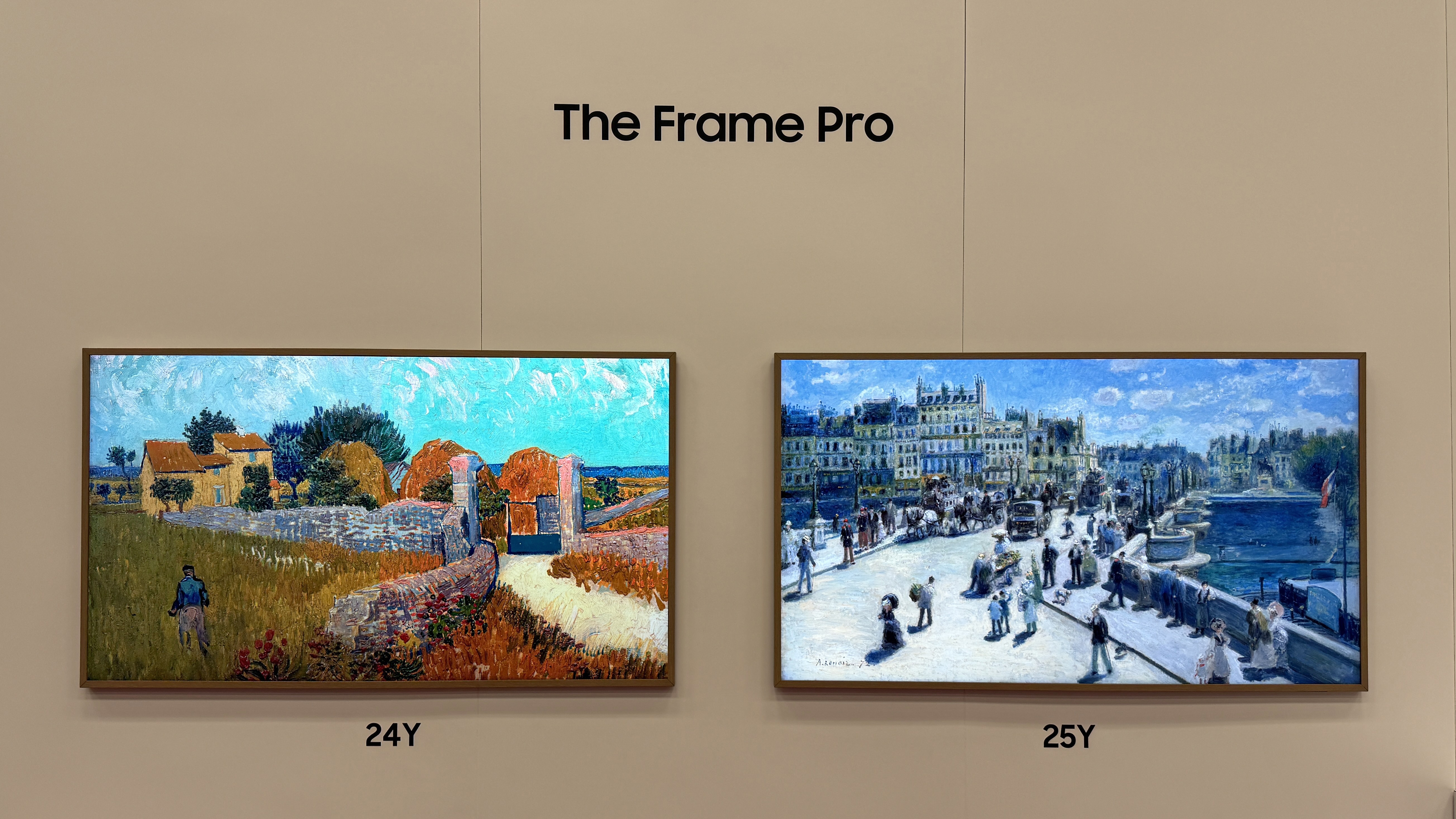
We’ve always been a little ambivalent about Samsung’s popular The Frame TVs at TechRadar, but that could soon change. Our resident TV expert Matt Bolton has just seen a demo of the The Frame Pro mini-LED TV at CES 2025 and says “the new screen is a total game-changer”.
When compared to the classic The Frame model, the difference is apparently “night and day” due to the inclusion of the company’s Neo QLED mini-LED tech and local dimming, which improves realism and means the “colors are massively richer and bold”.
I saw The Frame Pro in action next to a regular 2024 The Frame TV, and the difference is staggering. We’ve always had a slightly cool relationship with The Frame TVs here on TechRadar, because they’re wildly popular and we understand why people like them, but it always rankled that they used such mediocre image tech.
First look: LG C5 OLED TV
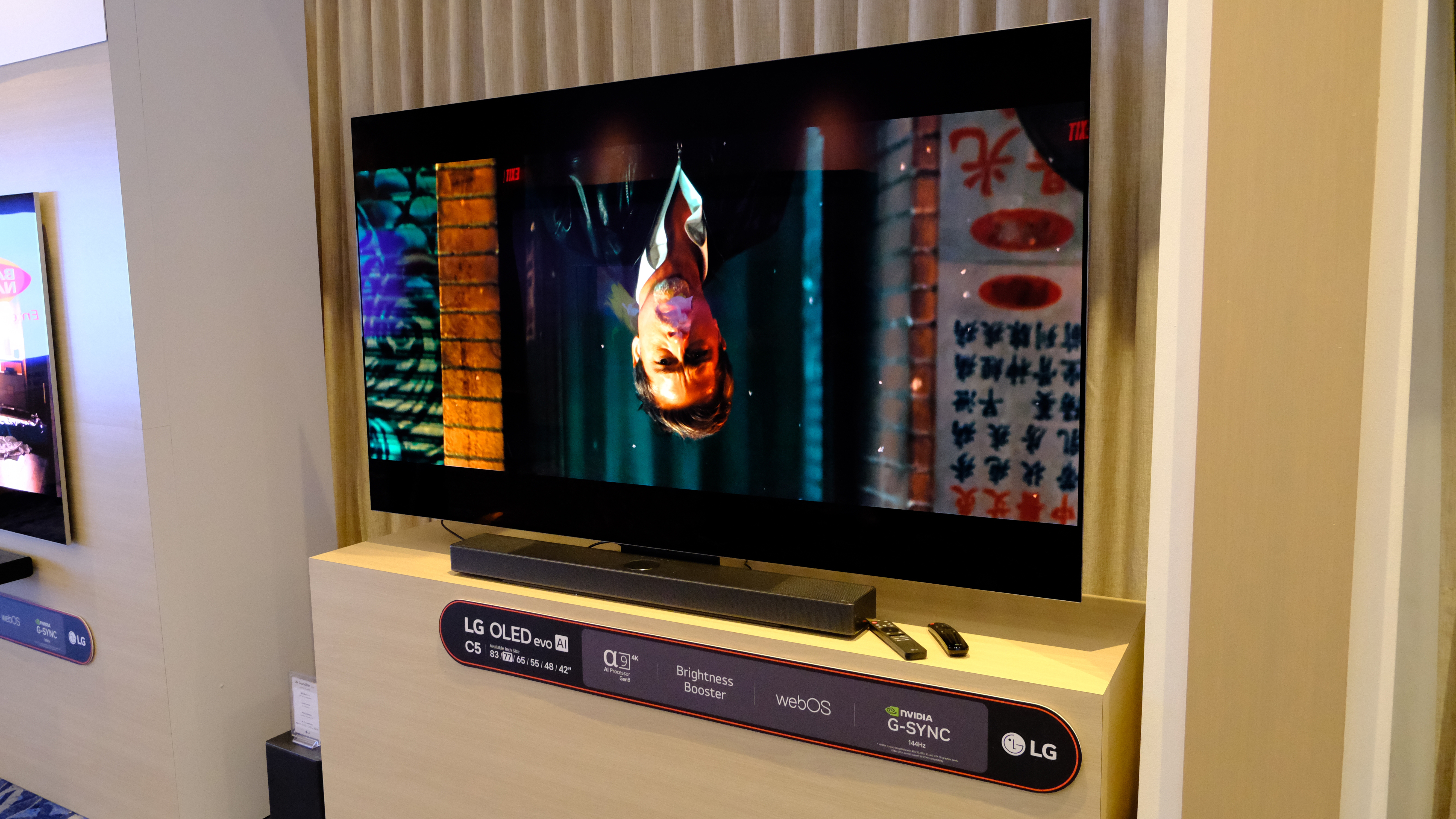
LG’s new mid-range C5 OLED TV wasn’t given the fanfare of its G5 and M5 flagship TVs, but TechRadar’s Matt Bolteon (Managing Editor, Entertainment) managed to track it down for a demo. And if you’re in the market for well-priced panel in 2025, it’s shaping up very nicely.
There’s no pricing for it yet (and that’ll be key), but it’ll effectively be an LG C4 with improved processing, a slightly brighter display, and new webOS features. We’ve called it “another great-looking set” – to find out why, check out our full report from the show floor below.




















+ There are no comments
Add yours